(PDF) Entrepreneurship and Small Business Management Techology
VerifiedAdded on 2021/02/19
|20
|6141
|105
AI Summary
Contribute Materials
Your contribution can guide someone’s learning journey. Share your
documents today.

Entrepreneurship and Small
Business Management
Business Management
Secure Best Marks with AI Grader
Need help grading? Try our AI Grader for instant feedback on your assignments.
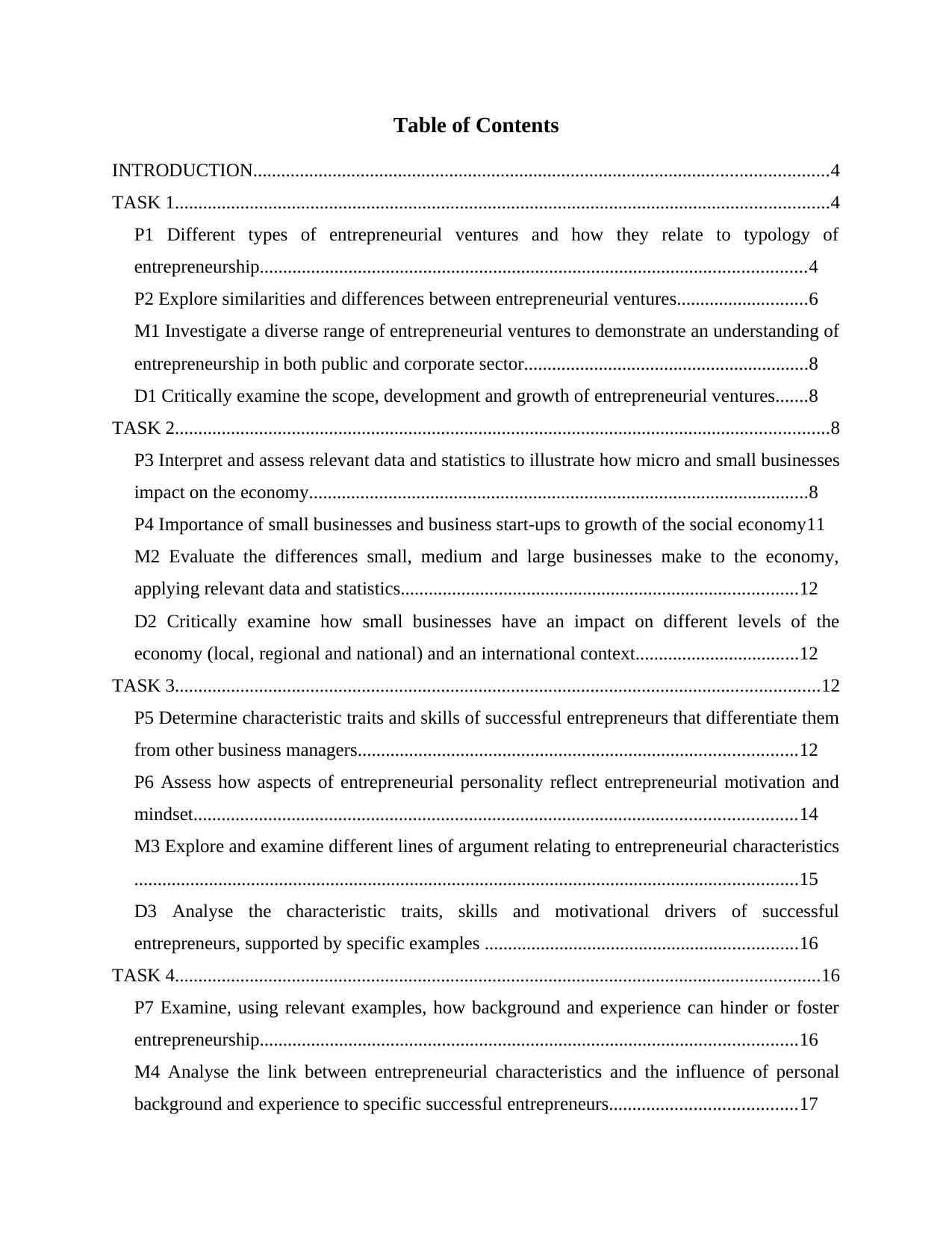
Table of Contents
INTRODUCTION...........................................................................................................................4
TASK 1............................................................................................................................................4
P1 Different types of entrepreneurial ventures and how they relate to typology of
entrepreneurship.....................................................................................................................4
P2 Explore similarities and differences between entrepreneurial ventures............................6
M1 Investigate a diverse range of entrepreneurial ventures to demonstrate an understanding of
entrepreneurship in both public and corporate sector.............................................................8
D1 Critically examine the scope, development and growth of entrepreneurial ventures.......8
TASK 2............................................................................................................................................8
P3 Interpret and assess relevant data and statistics to illustrate how micro and small businesses
impact on the economy...........................................................................................................8
P4 Importance of small businesses and business start-ups to growth of the social economy11
M2 Evaluate the differences small, medium and large businesses make to the economy,
applying relevant data and statistics.....................................................................................12
D2 Critically examine how small businesses have an impact on different levels of the
economy (local, regional and national) and an international context...................................12
TASK 3..........................................................................................................................................12
P5 Determine characteristic traits and skills of successful entrepreneurs that differentiate them
from other business managers..............................................................................................12
P6 Assess how aspects of entrepreneurial personality reflect entrepreneurial motivation and
mindset.................................................................................................................................14
M3 Explore and examine different lines of argument relating to entrepreneurial characteristics
..............................................................................................................................................15
D3 Analyse the characteristic traits, skills and motivational drivers of successful
entrepreneurs, supported by specific examples ...................................................................16
TASK 4..........................................................................................................................................16
P7 Examine, using relevant examples, how background and experience can hinder or foster
entrepreneurship...................................................................................................................16
M4 Analyse the link between entrepreneurial characteristics and the influence of personal
background and experience to specific successful entrepreneurs........................................17
INTRODUCTION...........................................................................................................................4
TASK 1............................................................................................................................................4
P1 Different types of entrepreneurial ventures and how they relate to typology of
entrepreneurship.....................................................................................................................4
P2 Explore similarities and differences between entrepreneurial ventures............................6
M1 Investigate a diverse range of entrepreneurial ventures to demonstrate an understanding of
entrepreneurship in both public and corporate sector.............................................................8
D1 Critically examine the scope, development and growth of entrepreneurial ventures.......8
TASK 2............................................................................................................................................8
P3 Interpret and assess relevant data and statistics to illustrate how micro and small businesses
impact on the economy...........................................................................................................8
P4 Importance of small businesses and business start-ups to growth of the social economy11
M2 Evaluate the differences small, medium and large businesses make to the economy,
applying relevant data and statistics.....................................................................................12
D2 Critically examine how small businesses have an impact on different levels of the
economy (local, regional and national) and an international context...................................12
TASK 3..........................................................................................................................................12
P5 Determine characteristic traits and skills of successful entrepreneurs that differentiate them
from other business managers..............................................................................................12
P6 Assess how aspects of entrepreneurial personality reflect entrepreneurial motivation and
mindset.................................................................................................................................14
M3 Explore and examine different lines of argument relating to entrepreneurial characteristics
..............................................................................................................................................15
D3 Analyse the characteristic traits, skills and motivational drivers of successful
entrepreneurs, supported by specific examples ...................................................................16
TASK 4..........................................................................................................................................16
P7 Examine, using relevant examples, how background and experience can hinder or foster
entrepreneurship...................................................................................................................16
M4 Analyse the link between entrepreneurial characteristics and the influence of personal
background and experience to specific successful entrepreneurs........................................17

D4 Critically evaluate how background and experience influences entrepreneurs, both
positively and negatively, by comparing and contrasting examples....................................17
CONCLUSION..............................................................................................................................18
REFERENCES..............................................................................................................................19
positively and negatively, by comparing and contrasting examples....................................17
CONCLUSION..............................................................................................................................18
REFERENCES..............................................................................................................................19
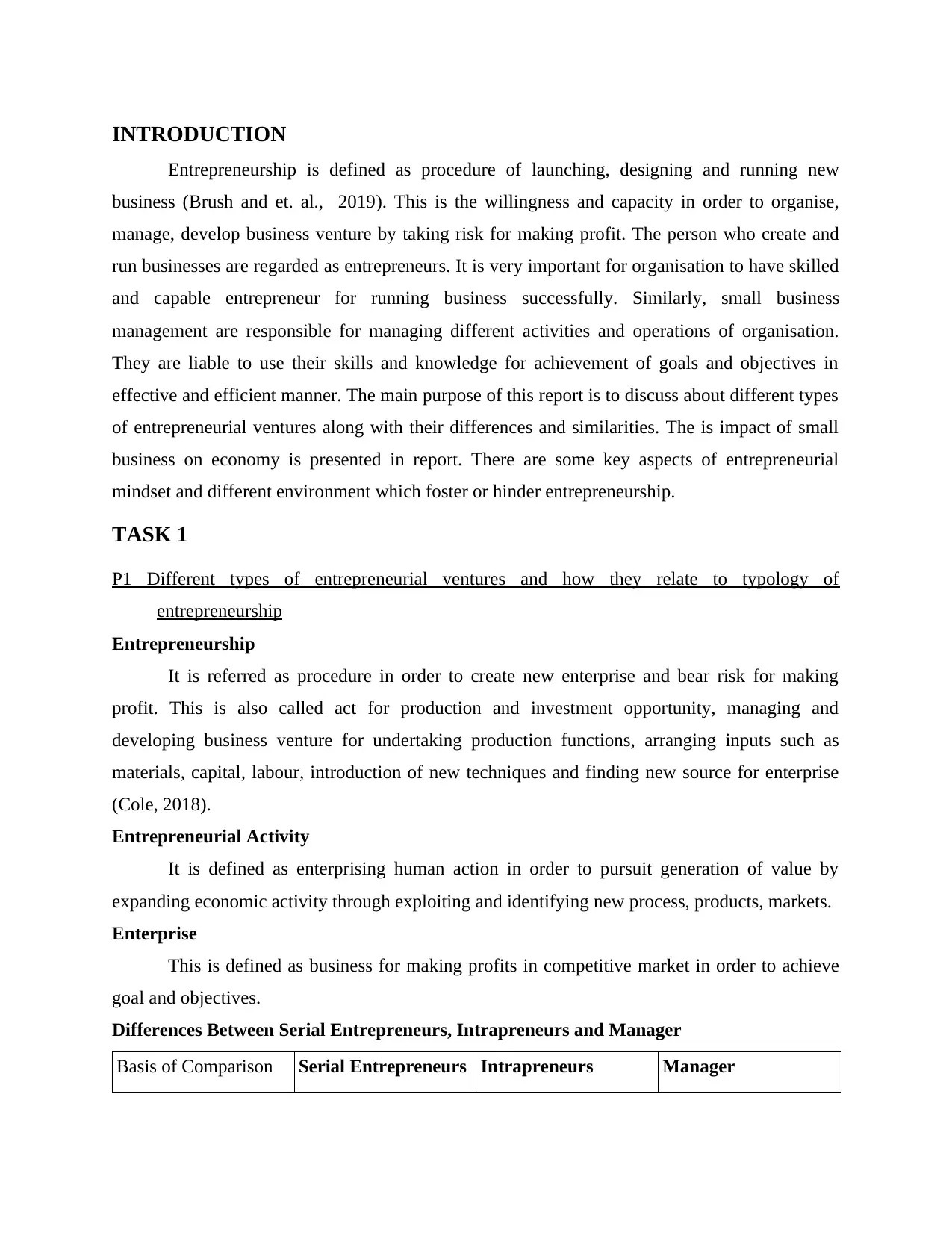
INTRODUCTION
Entrepreneurship is defined as procedure of launching, designing and running new
business (Brush and et. al., 2019). This is the willingness and capacity in order to organise,
manage, develop business venture by taking risk for making profit. The person who create and
run businesses are regarded as entrepreneurs. It is very important for organisation to have skilled
and capable entrepreneur for running business successfully. Similarly, small business
management are responsible for managing different activities and operations of organisation.
They are liable to use their skills and knowledge for achievement of goals and objectives in
effective and efficient manner. The main purpose of this report is to discuss about different types
of entrepreneurial ventures along with their differences and similarities. The is impact of small
business on economy is presented in report. There are some key aspects of entrepreneurial
mindset and different environment which foster or hinder entrepreneurship.
TASK 1
P1 Different types of entrepreneurial ventures and how they relate to typology of
entrepreneurship
Entrepreneurship
It is referred as procedure in order to create new enterprise and bear risk for making
profit. This is also called act for production and investment opportunity, managing and
developing business venture for undertaking production functions, arranging inputs such as
materials, capital, labour, introduction of new techniques and finding new source for enterprise
(Cole, 2018).
Entrepreneurial Activity
It is defined as enterprising human action in order to pursuit generation of value by
expanding economic activity through exploiting and identifying new process, products, markets.
Enterprise
This is defined as business for making profits in competitive market in order to achieve
goal and objectives.
Differences Between Serial Entrepreneurs, Intrapreneurs and Manager
Basis of Comparison Serial Entrepreneurs Intrapreneurs Manager
Entrepreneurship is defined as procedure of launching, designing and running new
business (Brush and et. al., 2019). This is the willingness and capacity in order to organise,
manage, develop business venture by taking risk for making profit. The person who create and
run businesses are regarded as entrepreneurs. It is very important for organisation to have skilled
and capable entrepreneur for running business successfully. Similarly, small business
management are responsible for managing different activities and operations of organisation.
They are liable to use their skills and knowledge for achievement of goals and objectives in
effective and efficient manner. The main purpose of this report is to discuss about different types
of entrepreneurial ventures along with their differences and similarities. The is impact of small
business on economy is presented in report. There are some key aspects of entrepreneurial
mindset and different environment which foster or hinder entrepreneurship.
TASK 1
P1 Different types of entrepreneurial ventures and how they relate to typology of
entrepreneurship
Entrepreneurship
It is referred as procedure in order to create new enterprise and bear risk for making
profit. This is also called act for production and investment opportunity, managing and
developing business venture for undertaking production functions, arranging inputs such as
materials, capital, labour, introduction of new techniques and finding new source for enterprise
(Cole, 2018).
Entrepreneurial Activity
It is defined as enterprising human action in order to pursuit generation of value by
expanding economic activity through exploiting and identifying new process, products, markets.
Enterprise
This is defined as business for making profits in competitive market in order to achieve
goal and objectives.
Differences Between Serial Entrepreneurs, Intrapreneurs and Manager
Basis of Comparison Serial Entrepreneurs Intrapreneurs Manager
Secure Best Marks with AI Grader
Need help grading? Try our AI Grader for instant feedback on your assignments.
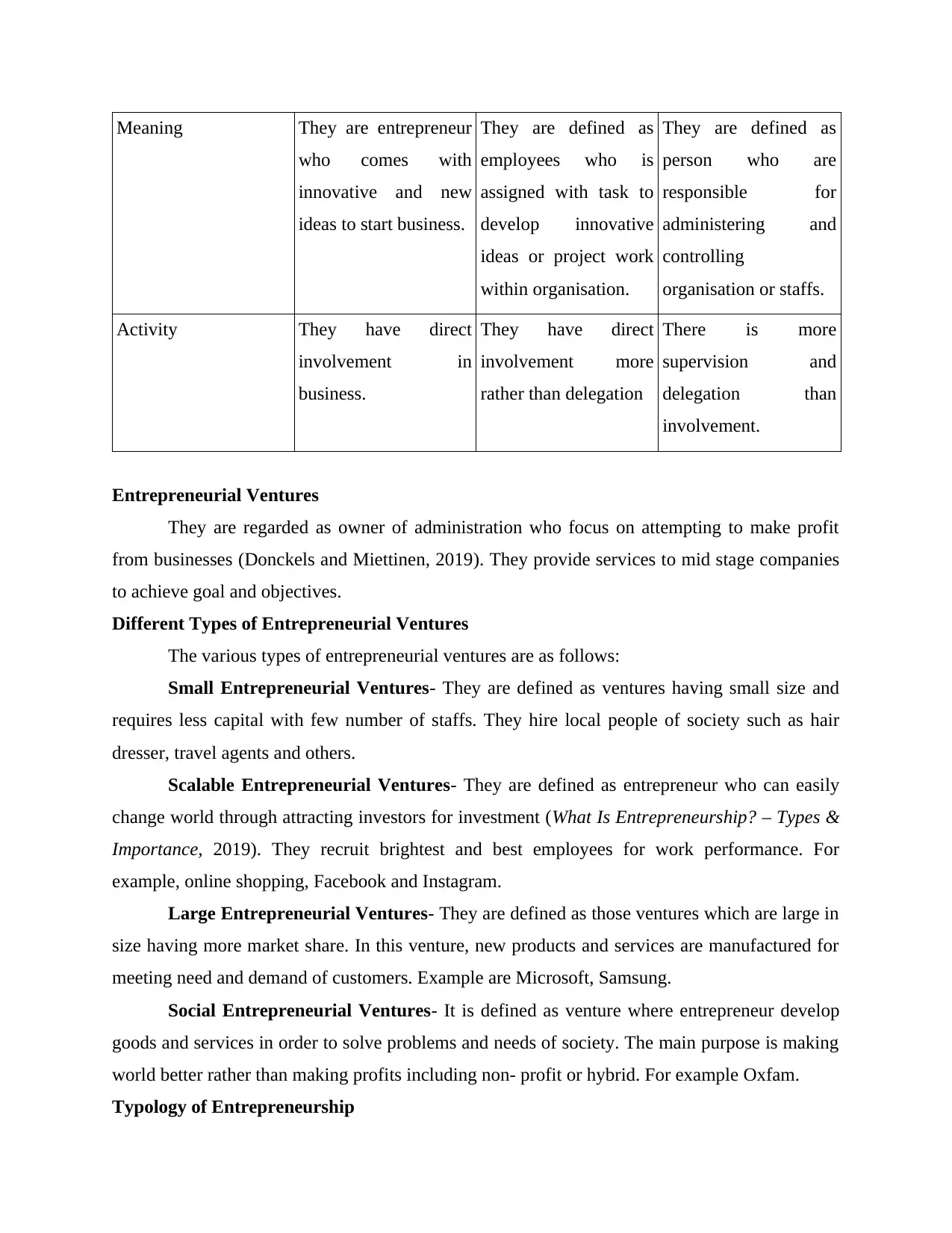
Meaning They are entrepreneur
who comes with
innovative and new
ideas to start business.
They are defined as
employees who is
assigned with task to
develop innovative
ideas or project work
within organisation.
They are defined as
person who are
responsible for
administering and
controlling
organisation or staffs.
Activity They have direct
involvement in
business.
They have direct
involvement more
rather than delegation
There is more
supervision and
delegation than
involvement.
Entrepreneurial Ventures
They are regarded as owner of administration who focus on attempting to make profit
from businesses (Donckels and Miettinen, 2019). They provide services to mid stage companies
to achieve goal and objectives.
Different Types of Entrepreneurial Ventures
The various types of entrepreneurial ventures are as follows:
Small Entrepreneurial Ventures- They are defined as ventures having small size and
requires less capital with few number of staffs. They hire local people of society such as hair
dresser, travel agents and others.
Scalable Entrepreneurial Ventures- They are defined as entrepreneur who can easily
change world through attracting investors for investment (What Is Entrepreneurship? – Types &
Importance, 2019). They recruit brightest and best employees for work performance. For
example, online shopping, Facebook and Instagram.
Large Entrepreneurial Ventures- They are defined as those ventures which are large in
size having more market share. In this venture, new products and services are manufactured for
meeting need and demand of customers. Example are Microsoft, Samsung.
Social Entrepreneurial Ventures- It is defined as venture where entrepreneur develop
goods and services in order to solve problems and needs of society. The main purpose is making
world better rather than making profits including non- profit or hybrid. For example Oxfam.
Typology of Entrepreneurship
who comes with
innovative and new
ideas to start business.
They are defined as
employees who is
assigned with task to
develop innovative
ideas or project work
within organisation.
They are defined as
person who are
responsible for
administering and
controlling
organisation or staffs.
Activity They have direct
involvement in
business.
They have direct
involvement more
rather than delegation
There is more
supervision and
delegation than
involvement.
Entrepreneurial Ventures
They are regarded as owner of administration who focus on attempting to make profit
from businesses (Donckels and Miettinen, 2019). They provide services to mid stage companies
to achieve goal and objectives.
Different Types of Entrepreneurial Ventures
The various types of entrepreneurial ventures are as follows:
Small Entrepreneurial Ventures- They are defined as ventures having small size and
requires less capital with few number of staffs. They hire local people of society such as hair
dresser, travel agents and others.
Scalable Entrepreneurial Ventures- They are defined as entrepreneur who can easily
change world through attracting investors for investment (What Is Entrepreneurship? – Types &
Importance, 2019). They recruit brightest and best employees for work performance. For
example, online shopping, Facebook and Instagram.
Large Entrepreneurial Ventures- They are defined as those ventures which are large in
size having more market share. In this venture, new products and services are manufactured for
meeting need and demand of customers. Example are Microsoft, Samsung.
Social Entrepreneurial Ventures- It is defined as venture where entrepreneur develop
goods and services in order to solve problems and needs of society. The main purpose is making
world better rather than making profits including non- profit or hybrid. For example Oxfam.
Typology of Entrepreneurship
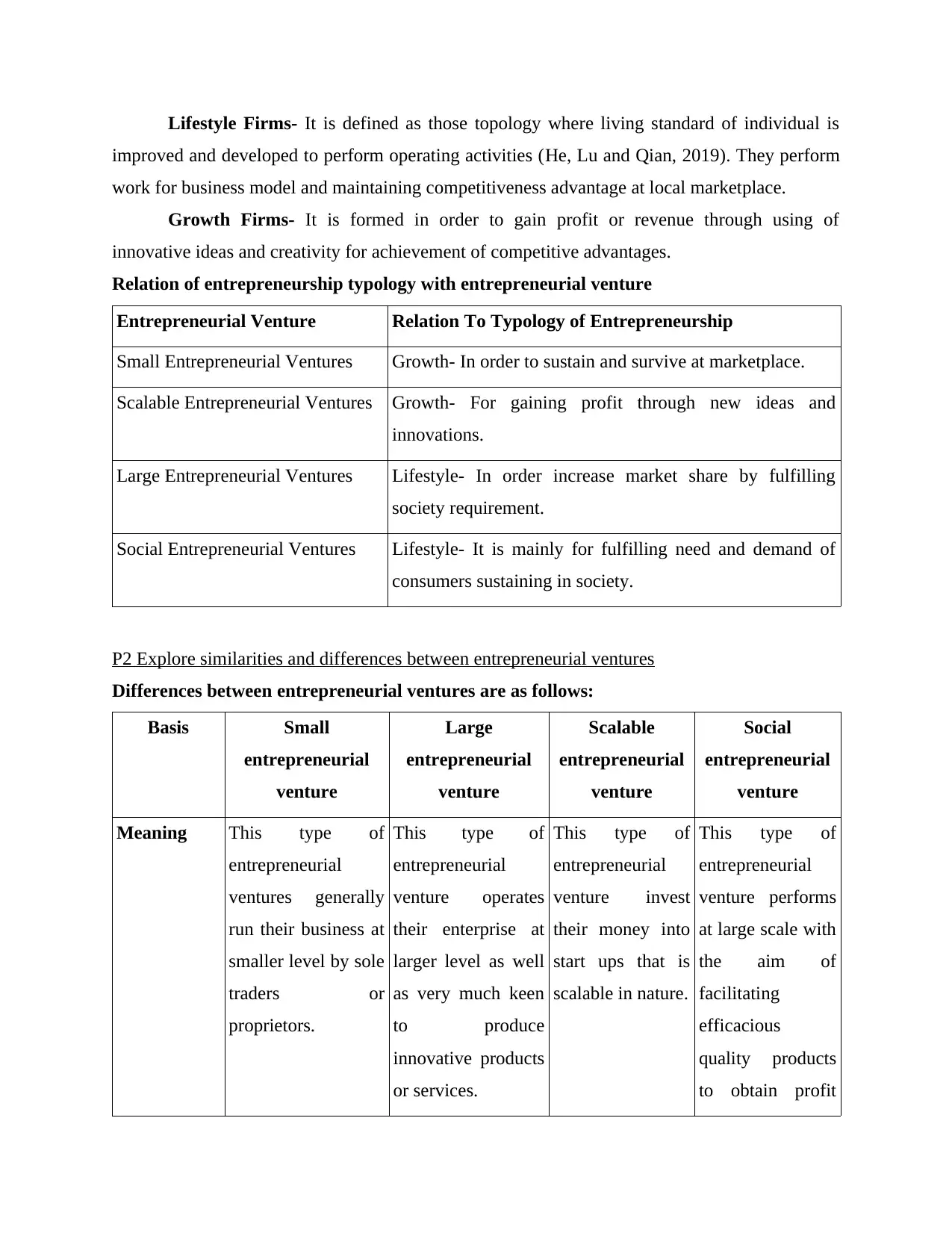
Lifestyle Firms- It is defined as those topology where living standard of individual is
improved and developed to perform operating activities (He, Lu and Qian, 2019). They perform
work for business model and maintaining competitiveness advantage at local marketplace.
Growth Firms- It is formed in order to gain profit or revenue through using of
innovative ideas and creativity for achievement of competitive advantages.
Relation of entrepreneurship typology with entrepreneurial venture
Entrepreneurial Venture Relation To Typology of Entrepreneurship
Small Entrepreneurial Ventures Growth- In order to sustain and survive at marketplace.
Scalable Entrepreneurial Ventures Growth- For gaining profit through new ideas and
innovations.
Large Entrepreneurial Ventures Lifestyle- In order increase market share by fulfilling
society requirement.
Social Entrepreneurial Ventures Lifestyle- It is mainly for fulfilling need and demand of
consumers sustaining in society.
P2 Explore similarities and differences between entrepreneurial ventures
Differences between entrepreneurial ventures are as follows:
Basis Small
entrepreneurial
venture
Large
entrepreneurial
venture
Scalable
entrepreneurial
venture
Social
entrepreneurial
venture
Meaning This type of
entrepreneurial
ventures generally
run their business at
smaller level by sole
traders or
proprietors.
This type of
entrepreneurial
venture operates
their enterprise at
larger level as well
as very much keen
to produce
innovative products
or services.
This type of
entrepreneurial
venture invest
their money into
start ups that is
scalable in nature.
This type of
entrepreneurial
venture performs
at large scale with
the aim of
facilitating
efficacious
quality products
to obtain profit
improved and developed to perform operating activities (He, Lu and Qian, 2019). They perform
work for business model and maintaining competitiveness advantage at local marketplace.
Growth Firms- It is formed in order to gain profit or revenue through using of
innovative ideas and creativity for achievement of competitive advantages.
Relation of entrepreneurship typology with entrepreneurial venture
Entrepreneurial Venture Relation To Typology of Entrepreneurship
Small Entrepreneurial Ventures Growth- In order to sustain and survive at marketplace.
Scalable Entrepreneurial Ventures Growth- For gaining profit through new ideas and
innovations.
Large Entrepreneurial Ventures Lifestyle- In order increase market share by fulfilling
society requirement.
Social Entrepreneurial Ventures Lifestyle- It is mainly for fulfilling need and demand of
consumers sustaining in society.
P2 Explore similarities and differences between entrepreneurial ventures
Differences between entrepreneurial ventures are as follows:
Basis Small
entrepreneurial
venture
Large
entrepreneurial
venture
Scalable
entrepreneurial
venture
Social
entrepreneurial
venture
Meaning This type of
entrepreneurial
ventures generally
run their business at
smaller level by sole
traders or
proprietors.
This type of
entrepreneurial
venture operates
their enterprise at
larger level as well
as very much keen
to produce
innovative products
or services.
This type of
entrepreneurial
venture invest
their money into
start ups that is
scalable in nature.
This type of
entrepreneurial
venture performs
at large scale with
the aim of
facilitating
efficacious
quality products
to obtain profit
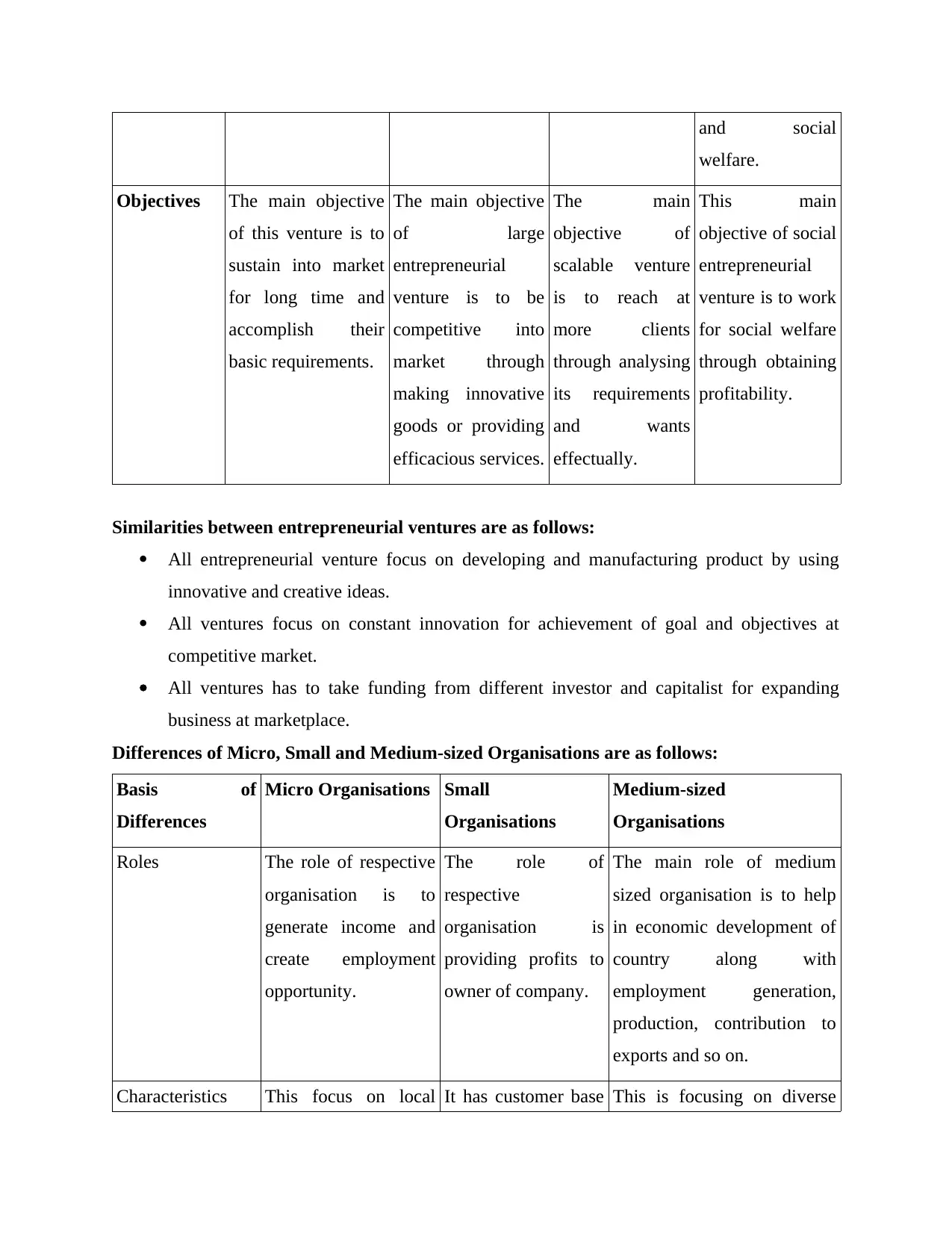
and social
welfare.
Objectives The main objective
of this venture is to
sustain into market
for long time and
accomplish their
basic requirements.
The main objective
of large
entrepreneurial
venture is to be
competitive into
market through
making innovative
goods or providing
efficacious services.
The main
objective of
scalable venture
is to reach at
more clients
through analysing
its requirements
and wants
effectually.
This main
objective of social
entrepreneurial
venture is to work
for social welfare
through obtaining
profitability.
Similarities between entrepreneurial ventures are as follows:
All entrepreneurial venture focus on developing and manufacturing product by using
innovative and creative ideas.
All ventures focus on constant innovation for achievement of goal and objectives at
competitive market.
All ventures has to take funding from different investor and capitalist for expanding
business at marketplace.
Differences of Micro, Small and Medium-sized Organisations are as follows:
Basis of
Differences
Micro Organisations Small
Organisations
Medium-sized
Organisations
Roles The role of respective
organisation is to
generate income and
create employment
opportunity.
The role of
respective
organisation is
providing profits to
owner of company.
The main role of medium
sized organisation is to help
in economic development of
country along with
employment generation,
production, contribution to
exports and so on.
Characteristics This focus on local It has customer base This is focusing on diverse
welfare.
Objectives The main objective
of this venture is to
sustain into market
for long time and
accomplish their
basic requirements.
The main objective
of large
entrepreneurial
venture is to be
competitive into
market through
making innovative
goods or providing
efficacious services.
The main
objective of
scalable venture
is to reach at
more clients
through analysing
its requirements
and wants
effectually.
This main
objective of social
entrepreneurial
venture is to work
for social welfare
through obtaining
profitability.
Similarities between entrepreneurial ventures are as follows:
All entrepreneurial venture focus on developing and manufacturing product by using
innovative and creative ideas.
All ventures focus on constant innovation for achievement of goal and objectives at
competitive market.
All ventures has to take funding from different investor and capitalist for expanding
business at marketplace.
Differences of Micro, Small and Medium-sized Organisations are as follows:
Basis of
Differences
Micro Organisations Small
Organisations
Medium-sized
Organisations
Roles The role of respective
organisation is to
generate income and
create employment
opportunity.
The role of
respective
organisation is
providing profits to
owner of company.
The main role of medium
sized organisation is to help
in economic development of
country along with
employment generation,
production, contribution to
exports and so on.
Characteristics This focus on local It has customer base This is focusing on diverse
Paraphrase This Document
Need a fresh take? Get an instant paraphrase of this document with our AI Paraphraser
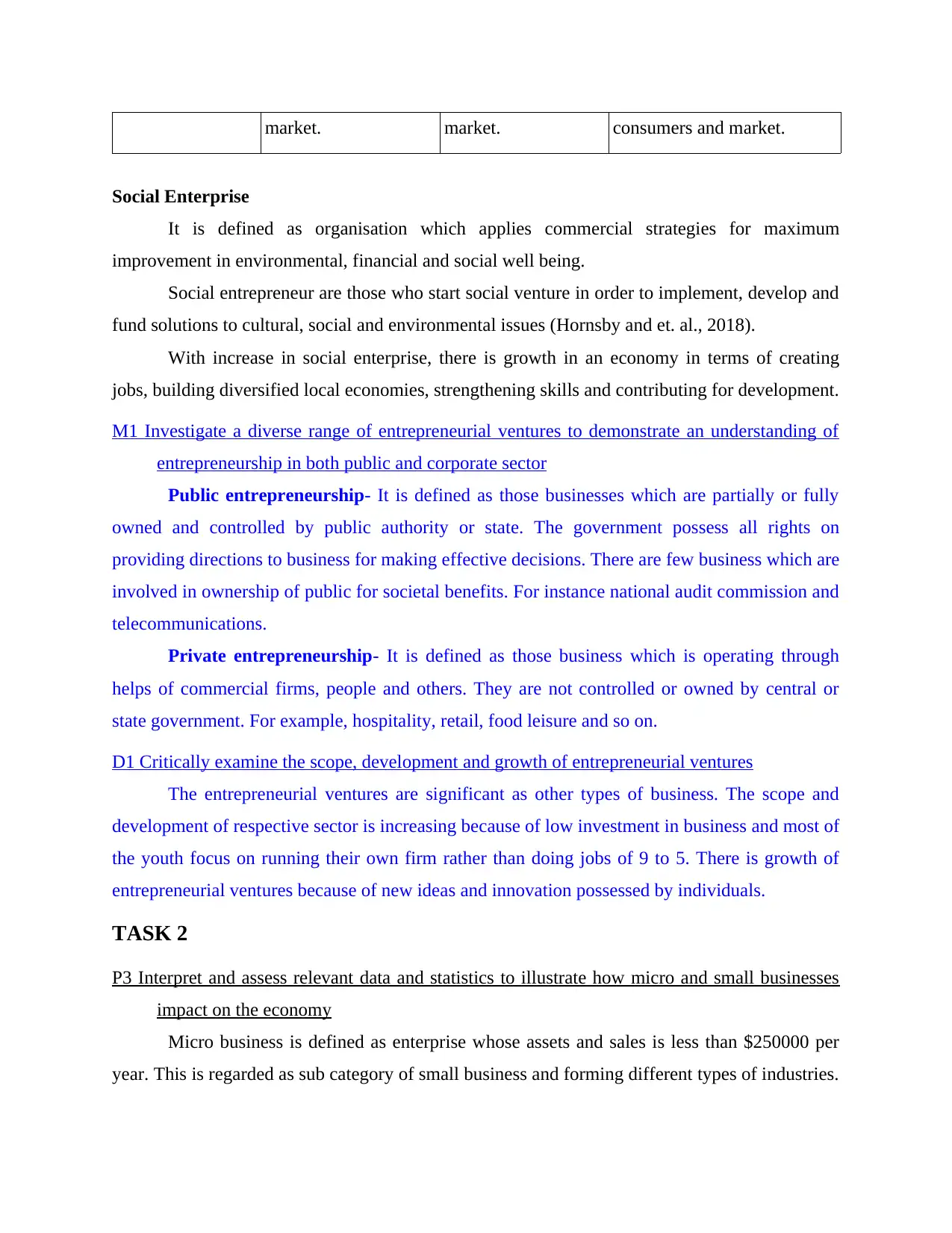
market. market. consumers and market.
Social Enterprise
It is defined as organisation which applies commercial strategies for maximum
improvement in environmental, financial and social well being.
Social entrepreneur are those who start social venture in order to implement, develop and
fund solutions to cultural, social and environmental issues (Hornsby and et. al., 2018).
With increase in social enterprise, there is growth in an economy in terms of creating
jobs, building diversified local economies, strengthening skills and contributing for development.
M1 Investigate a diverse range of entrepreneurial ventures to demonstrate an understanding of
entrepreneurship in both public and corporate sector
Public entrepreneurship- It is defined as those businesses which are partially or fully
owned and controlled by public authority or state. The government possess all rights on
providing directions to business for making effective decisions. There are few business which are
involved in ownership of public for societal benefits. For instance national audit commission and
telecommunications.
Private entrepreneurship- It is defined as those business which is operating through
helps of commercial firms, people and others. They are not controlled or owned by central or
state government. For example, hospitality, retail, food leisure and so on.
D1 Critically examine the scope, development and growth of entrepreneurial ventures
The entrepreneurial ventures are significant as other types of business. The scope and
development of respective sector is increasing because of low investment in business and most of
the youth focus on running their own firm rather than doing jobs of 9 to 5. There is growth of
entrepreneurial ventures because of new ideas and innovation possessed by individuals.
TASK 2
P3 Interpret and assess relevant data and statistics to illustrate how micro and small businesses
impact on the economy
Micro business is defined as enterprise whose assets and sales is less than $250000 per
year. This is regarded as sub category of small business and forming different types of industries.
Social Enterprise
It is defined as organisation which applies commercial strategies for maximum
improvement in environmental, financial and social well being.
Social entrepreneur are those who start social venture in order to implement, develop and
fund solutions to cultural, social and environmental issues (Hornsby and et. al., 2018).
With increase in social enterprise, there is growth in an economy in terms of creating
jobs, building diversified local economies, strengthening skills and contributing for development.
M1 Investigate a diverse range of entrepreneurial ventures to demonstrate an understanding of
entrepreneurship in both public and corporate sector
Public entrepreneurship- It is defined as those businesses which are partially or fully
owned and controlled by public authority or state. The government possess all rights on
providing directions to business for making effective decisions. There are few business which are
involved in ownership of public for societal benefits. For instance national audit commission and
telecommunications.
Private entrepreneurship- It is defined as those business which is operating through
helps of commercial firms, people and others. They are not controlled or owned by central or
state government. For example, hospitality, retail, food leisure and so on.
D1 Critically examine the scope, development and growth of entrepreneurial ventures
The entrepreneurial ventures are significant as other types of business. The scope and
development of respective sector is increasing because of low investment in business and most of
the youth focus on running their own firm rather than doing jobs of 9 to 5. There is growth of
entrepreneurial ventures because of new ideas and innovation possessed by individuals.
TASK 2
P3 Interpret and assess relevant data and statistics to illustrate how micro and small businesses
impact on the economy
Micro business is defined as enterprise whose assets and sales is less than $250000 per
year. This is regarded as sub category of small business and forming different types of industries.
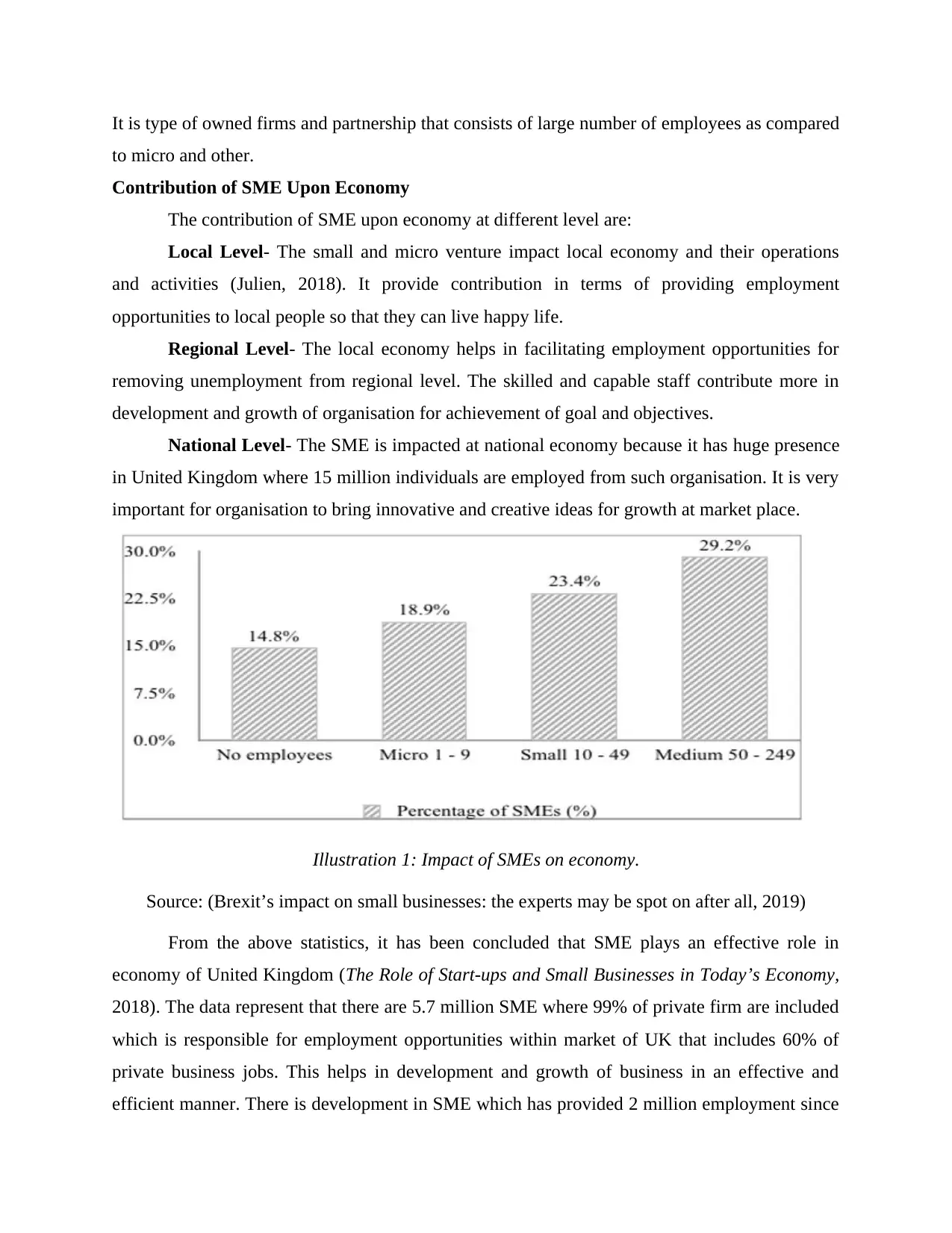
It is type of owned firms and partnership that consists of large number of employees as compared
to micro and other.
Contribution of SME Upon Economy
The contribution of SME upon economy at different level are:
Local Level- The small and micro venture impact local economy and their operations
and activities (Julien, 2018). It provide contribution in terms of providing employment
opportunities to local people so that they can live happy life.
Regional Level- The local economy helps in facilitating employment opportunities for
removing unemployment from regional level. The skilled and capable staff contribute more in
development and growth of organisation for achievement of goal and objectives.
National Level- The SME is impacted at national economy because it has huge presence
in United Kingdom where 15 million individuals are employed from such organisation. It is very
important for organisation to bring innovative and creative ideas for growth at market place.
Illustration 1: Impact of SMEs on economy.
Source: (Brexit’s impact on small businesses: the experts may be spot on after all, 2019)
From the above statistics, it has been concluded that SME plays an effective role in
economy of United Kingdom (The Role of Start-ups and Small Businesses in Today’s Economy,
2018). The data represent that there are 5.7 million SME where 99% of private firm are included
which is responsible for employment opportunities within market of UK that includes 60% of
private business jobs. This helps in development and growth of business in an effective and
efficient manner. There is development in SME which has provided 2 million employment since
to micro and other.
Contribution of SME Upon Economy
The contribution of SME upon economy at different level are:
Local Level- The small and micro venture impact local economy and their operations
and activities (Julien, 2018). It provide contribution in terms of providing employment
opportunities to local people so that they can live happy life.
Regional Level- The local economy helps in facilitating employment opportunities for
removing unemployment from regional level. The skilled and capable staff contribute more in
development and growth of organisation for achievement of goal and objectives.
National Level- The SME is impacted at national economy because it has huge presence
in United Kingdom where 15 million individuals are employed from such organisation. It is very
important for organisation to bring innovative and creative ideas for growth at market place.
Illustration 1: Impact of SMEs on economy.
Source: (Brexit’s impact on small businesses: the experts may be spot on after all, 2019)
From the above statistics, it has been concluded that SME plays an effective role in
economy of United Kingdom (The Role of Start-ups and Small Businesses in Today’s Economy,
2018). The data represent that there are 5.7 million SME where 99% of private firm are included
which is responsible for employment opportunities within market of UK that includes 60% of
private business jobs. This helps in development and growth of business in an effective and
efficient manner. There is development in SME which has provided 2 million employment since
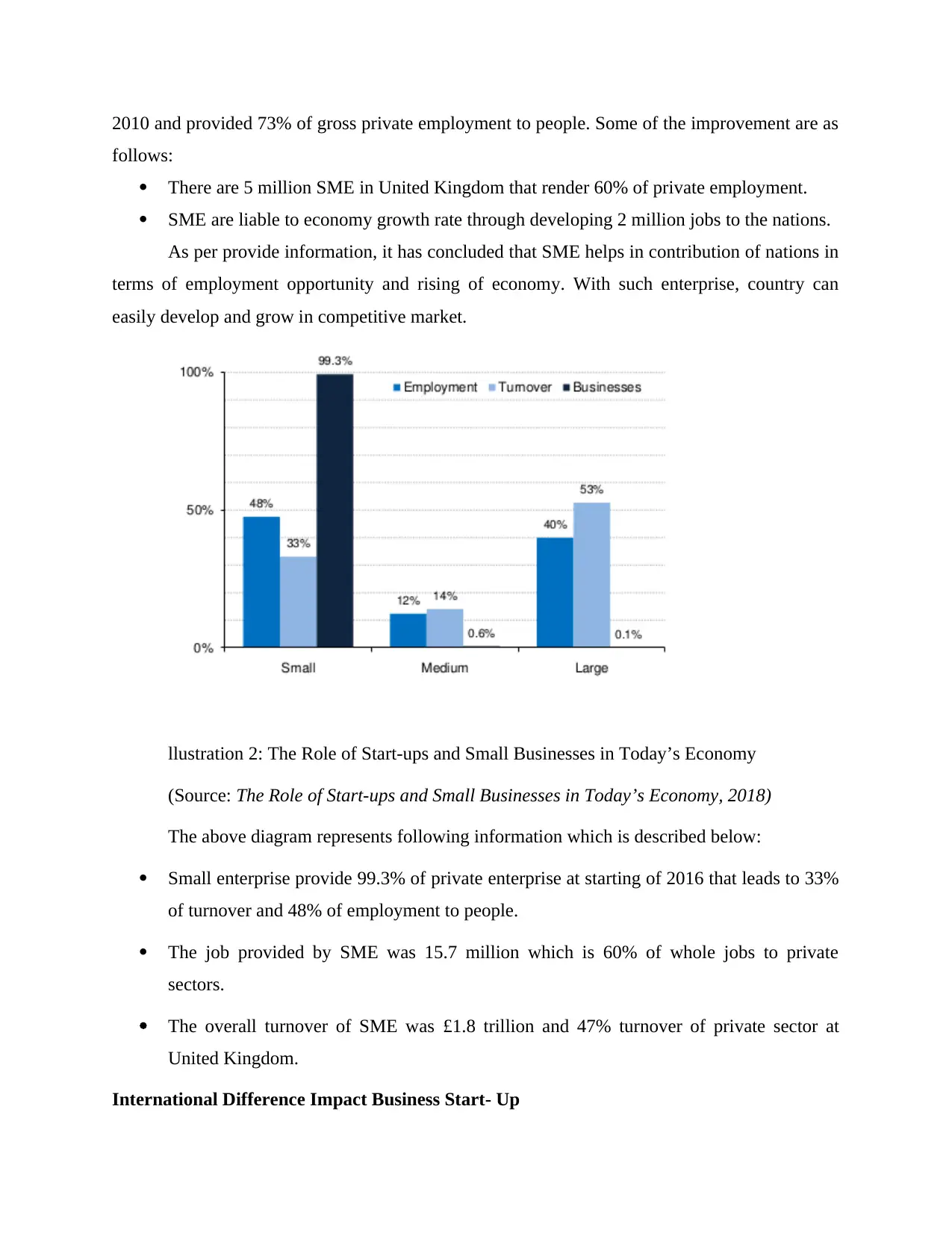
2010 and provided 73% of gross private employment to people. Some of the improvement are as
follows:
There are 5 million SME in United Kingdom that render 60% of private employment.
SME are liable to economy growth rate through developing 2 million jobs to the nations.
As per provide information, it has concluded that SME helps in contribution of nations in
terms of employment opportunity and rising of economy. With such enterprise, country can
easily develop and grow in competitive market.
llustration 2: The Role of Start-ups and Small Businesses in Today’s Economy
(Source: The Role of Start-ups and Small Businesses in Today’s Economy, 2018)
The above diagram represents following information which is described below:
Small enterprise provide 99.3% of private enterprise at starting of 2016 that leads to 33%
of turnover and 48% of employment to people.
The job provided by SME was 15.7 million which is 60% of whole jobs to private
sectors.
The overall turnover of SME was £1.8 trillion and 47% turnover of private sector at
United Kingdom.
International Difference Impact Business Start- Up
follows:
There are 5 million SME in United Kingdom that render 60% of private employment.
SME are liable to economy growth rate through developing 2 million jobs to the nations.
As per provide information, it has concluded that SME helps in contribution of nations in
terms of employment opportunity and rising of economy. With such enterprise, country can
easily develop and grow in competitive market.
llustration 2: The Role of Start-ups and Small Businesses in Today’s Economy
(Source: The Role of Start-ups and Small Businesses in Today’s Economy, 2018)
The above diagram represents following information which is described below:
Small enterprise provide 99.3% of private enterprise at starting of 2016 that leads to 33%
of turnover and 48% of employment to people.
The job provided by SME was 15.7 million which is 60% of whole jobs to private
sectors.
The overall turnover of SME was £1.8 trillion and 47% turnover of private sector at
United Kingdom.
International Difference Impact Business Start- Up
Secure Best Marks with AI Grader
Need help grading? Try our AI Grader for instant feedback on your assignments.
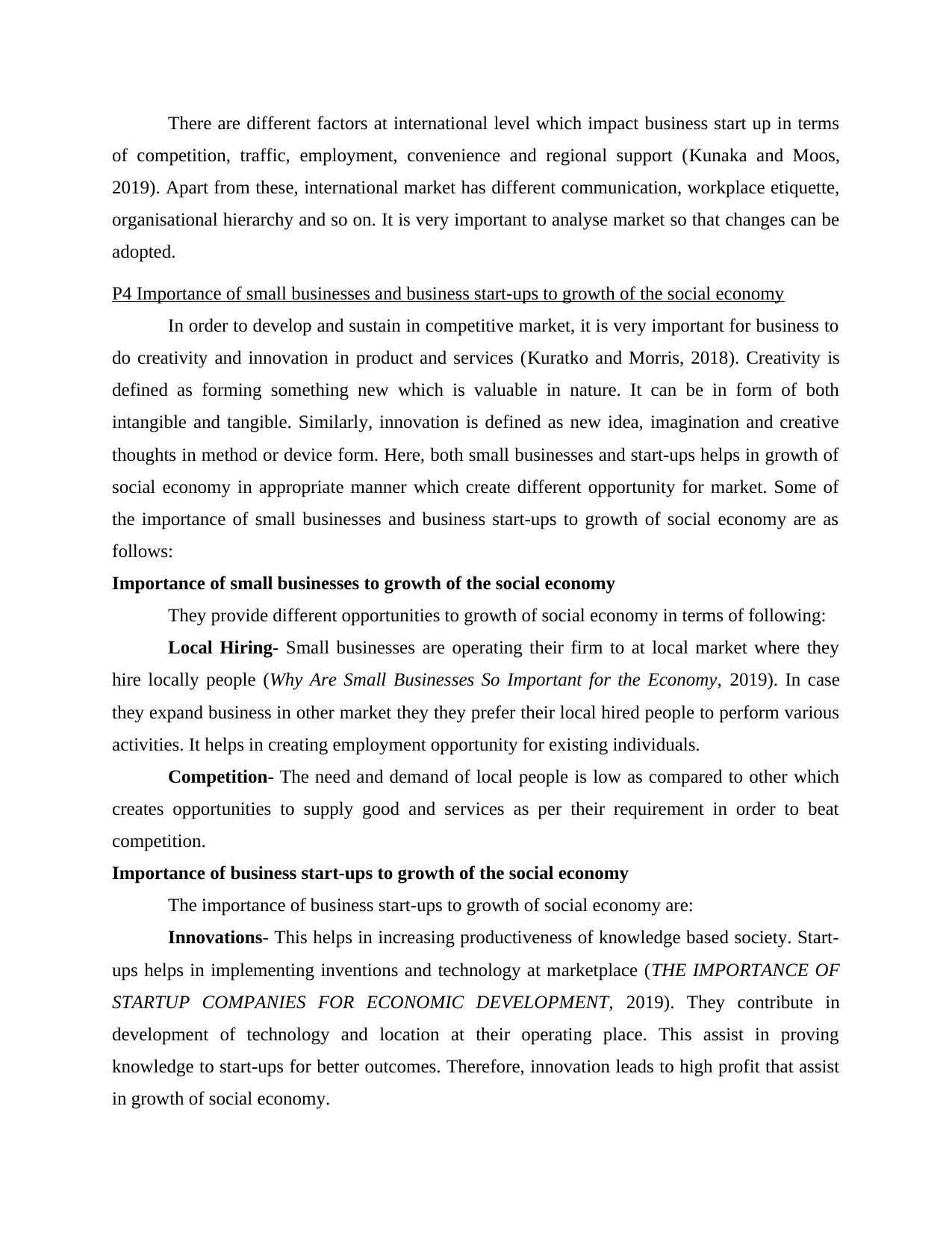
There are different factors at international level which impact business start up in terms
of competition, traffic, employment, convenience and regional support (Kunaka and Moos,
2019). Apart from these, international market has different communication, workplace etiquette,
organisational hierarchy and so on. It is very important to analyse market so that changes can be
adopted.
P4 Importance of small businesses and business start-ups to growth of the social economy
In order to develop and sustain in competitive market, it is very important for business to
do creativity and innovation in product and services (Kuratko and Morris, 2018). Creativity is
defined as forming something new which is valuable in nature. It can be in form of both
intangible and tangible. Similarly, innovation is defined as new idea, imagination and creative
thoughts in method or device form. Here, both small businesses and start-ups helps in growth of
social economy in appropriate manner which create different opportunity for market. Some of
the importance of small businesses and business start-ups to growth of social economy are as
follows:
Importance of small businesses to growth of the social economy
They provide different opportunities to growth of social economy in terms of following:
Local Hiring- Small businesses are operating their firm to at local market where they
hire locally people (Why Are Small Businesses So Important for the Economy, 2019). In case
they expand business in other market they they prefer their local hired people to perform various
activities. It helps in creating employment opportunity for existing individuals.
Competition- The need and demand of local people is low as compared to other which
creates opportunities to supply good and services as per their requirement in order to beat
competition.
Importance of business start-ups to growth of the social economy
The importance of business start-ups to growth of social economy are:
Innovations- This helps in increasing productiveness of knowledge based society. Start-
ups helps in implementing inventions and technology at marketplace (THE IMPORTANCE OF
STARTUP COMPANIES FOR ECONOMIC DEVELOPMENT, 2019). They contribute in
development of technology and location at their operating place. This assist in proving
knowledge to start-ups for better outcomes. Therefore, innovation leads to high profit that assist
in growth of social economy.
of competition, traffic, employment, convenience and regional support (Kunaka and Moos,
2019). Apart from these, international market has different communication, workplace etiquette,
organisational hierarchy and so on. It is very important to analyse market so that changes can be
adopted.
P4 Importance of small businesses and business start-ups to growth of the social economy
In order to develop and sustain in competitive market, it is very important for business to
do creativity and innovation in product and services (Kuratko and Morris, 2018). Creativity is
defined as forming something new which is valuable in nature. It can be in form of both
intangible and tangible. Similarly, innovation is defined as new idea, imagination and creative
thoughts in method or device form. Here, both small businesses and start-ups helps in growth of
social economy in appropriate manner which create different opportunity for market. Some of
the importance of small businesses and business start-ups to growth of social economy are as
follows:
Importance of small businesses to growth of the social economy
They provide different opportunities to growth of social economy in terms of following:
Local Hiring- Small businesses are operating their firm to at local market where they
hire locally people (Why Are Small Businesses So Important for the Economy, 2019). In case
they expand business in other market they they prefer their local hired people to perform various
activities. It helps in creating employment opportunity for existing individuals.
Competition- The need and demand of local people is low as compared to other which
creates opportunities to supply good and services as per their requirement in order to beat
competition.
Importance of business start-ups to growth of the social economy
The importance of business start-ups to growth of social economy are:
Innovations- This helps in increasing productiveness of knowledge based society. Start-
ups helps in implementing inventions and technology at marketplace (THE IMPORTANCE OF
STARTUP COMPANIES FOR ECONOMIC DEVELOPMENT, 2019). They contribute in
development of technology and location at their operating place. This assist in proving
knowledge to start-ups for better outcomes. Therefore, innovation leads to high profit that assist
in growth of social economy.
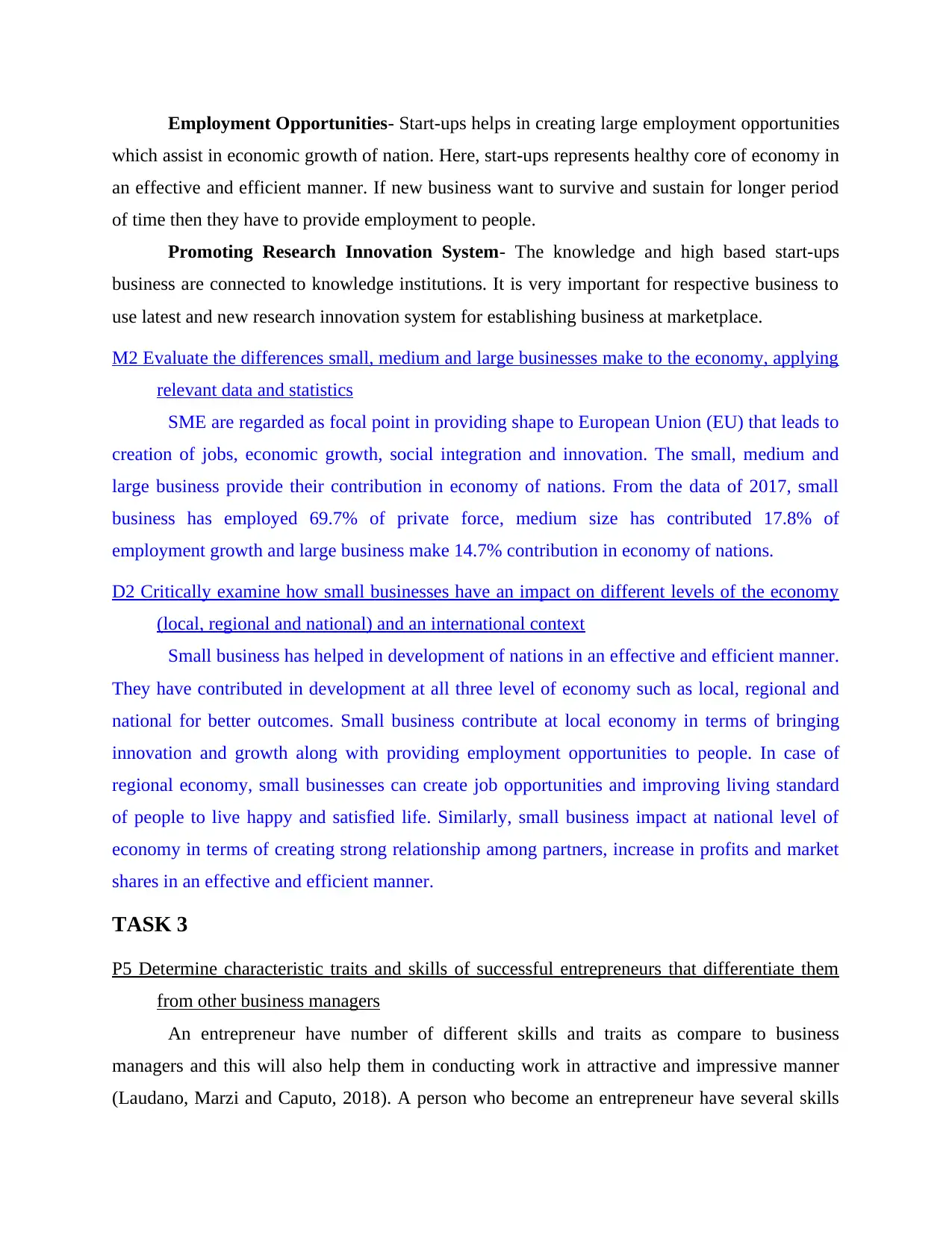
Employment Opportunities- Start-ups helps in creating large employment opportunities
which assist in economic growth of nation. Here, start-ups represents healthy core of economy in
an effective and efficient manner. If new business want to survive and sustain for longer period
of time then they have to provide employment to people.
Promoting Research Innovation System- The knowledge and high based start-ups
business are connected to knowledge institutions. It is very important for respective business to
use latest and new research innovation system for establishing business at marketplace.
M2 Evaluate the differences small, medium and large businesses make to the economy, applying
relevant data and statistics
SME are regarded as focal point in providing shape to European Union (EU) that leads to
creation of jobs, economic growth, social integration and innovation. The small, medium and
large business provide their contribution in economy of nations. From the data of 2017, small
business has employed 69.7% of private force, medium size has contributed 17.8% of
employment growth and large business make 14.7% contribution in economy of nations.
D2 Critically examine how small businesses have an impact on different levels of the economy
(local, regional and national) and an international context
Small business has helped in development of nations in an effective and efficient manner.
They have contributed in development at all three level of economy such as local, regional and
national for better outcomes. Small business contribute at local economy in terms of bringing
innovation and growth along with providing employment opportunities to people. In case of
regional economy, small businesses can create job opportunities and improving living standard
of people to live happy and satisfied life. Similarly, small business impact at national level of
economy in terms of creating strong relationship among partners, increase in profits and market
shares in an effective and efficient manner.
TASK 3
P5 Determine characteristic traits and skills of successful entrepreneurs that differentiate them
from other business managers
An entrepreneur have number of different skills and traits as compare to business
managers and this will also help them in conducting work in attractive and impressive manner
(Laudano, Marzi and Caputo, 2018). A person who become an entrepreneur have several skills
which assist in economic growth of nation. Here, start-ups represents healthy core of economy in
an effective and efficient manner. If new business want to survive and sustain for longer period
of time then they have to provide employment to people.
Promoting Research Innovation System- The knowledge and high based start-ups
business are connected to knowledge institutions. It is very important for respective business to
use latest and new research innovation system for establishing business at marketplace.
M2 Evaluate the differences small, medium and large businesses make to the economy, applying
relevant data and statistics
SME are regarded as focal point in providing shape to European Union (EU) that leads to
creation of jobs, economic growth, social integration and innovation. The small, medium and
large business provide their contribution in economy of nations. From the data of 2017, small
business has employed 69.7% of private force, medium size has contributed 17.8% of
employment growth and large business make 14.7% contribution in economy of nations.
D2 Critically examine how small businesses have an impact on different levels of the economy
(local, regional and national) and an international context
Small business has helped in development of nations in an effective and efficient manner.
They have contributed in development at all three level of economy such as local, regional and
national for better outcomes. Small business contribute at local economy in terms of bringing
innovation and growth along with providing employment opportunities to people. In case of
regional economy, small businesses can create job opportunities and improving living standard
of people to live happy and satisfied life. Similarly, small business impact at national level of
economy in terms of creating strong relationship among partners, increase in profits and market
shares in an effective and efficient manner.
TASK 3
P5 Determine characteristic traits and skills of successful entrepreneurs that differentiate them
from other business managers
An entrepreneur have number of different skills and traits as compare to business
managers and this will also help them in conducting work in attractive and impressive manner
(Laudano, Marzi and Caputo, 2018). A person who become an entrepreneur have several skills
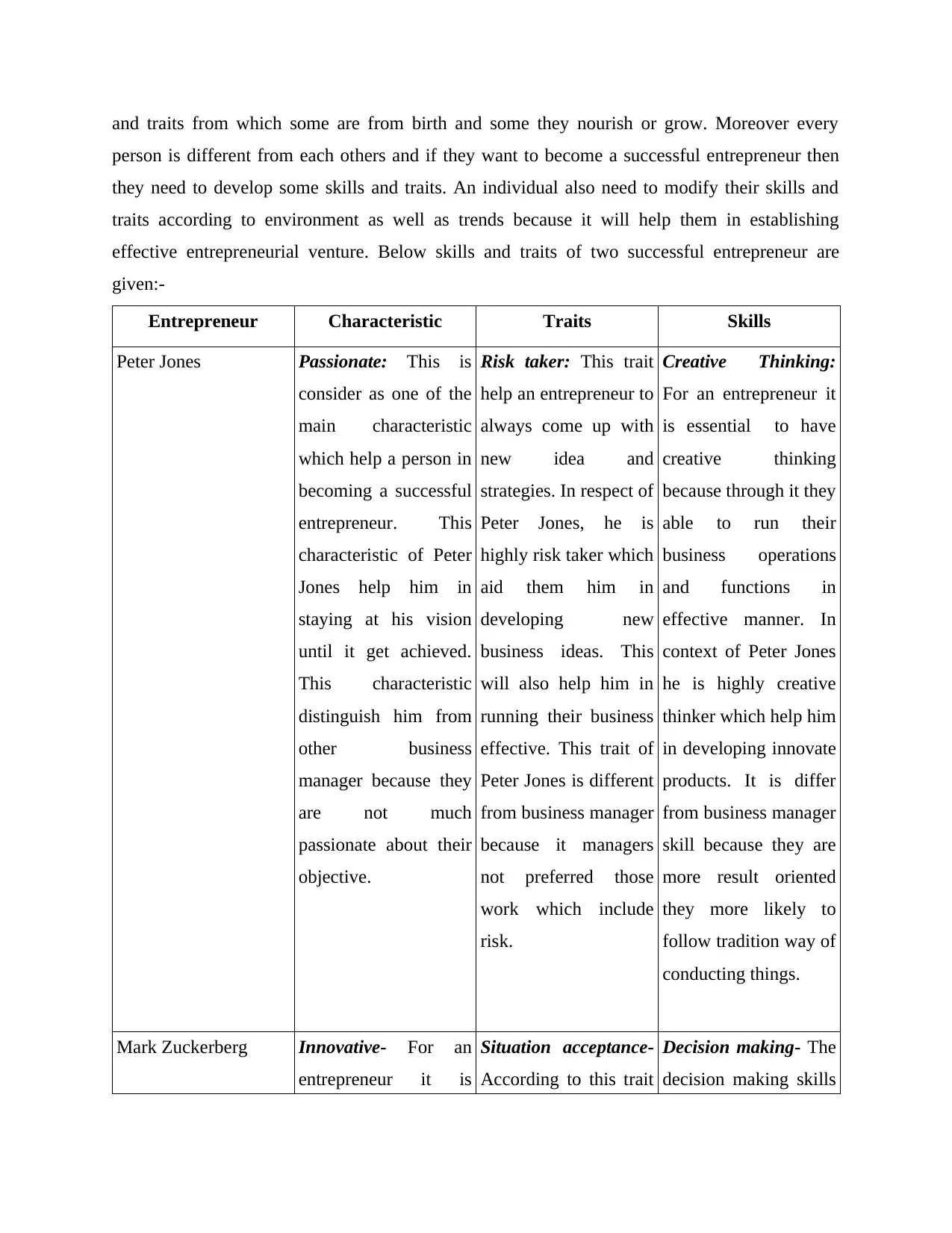
and traits from which some are from birth and some they nourish or grow. Moreover every
person is different from each others and if they want to become a successful entrepreneur then
they need to develop some skills and traits. An individual also need to modify their skills and
traits according to environment as well as trends because it will help them in establishing
effective entrepreneurial venture. Below skills and traits of two successful entrepreneur are
given:-
Entrepreneur Characteristic Traits Skills
Peter Jones Passionate: This is
consider as one of the
main characteristic
which help a person in
becoming a successful
entrepreneur. This
characteristic of Peter
Jones help him in
staying at his vision
until it get achieved.
This characteristic
distinguish him from
other business
manager because they
are not much
passionate about their
objective.
Risk taker: This trait
help an entrepreneur to
always come up with
new idea and
strategies. In respect of
Peter Jones, he is
highly risk taker which
aid them him in
developing new
business ideas. This
will also help him in
running their business
effective. This trait of
Peter Jones is different
from business manager
because it managers
not preferred those
work which include
risk.
Creative Thinking:
For an entrepreneur it
is essential to have
creative thinking
because through it they
able to run their
business operations
and functions in
effective manner. In
context of Peter Jones
he is highly creative
thinker which help him
in developing innovate
products. It is differ
from business manager
skill because they are
more result oriented
they more likely to
follow tradition way of
conducting things.
Mark Zuckerberg Innovative- For an
entrepreneur it is
Situation acceptance-
According to this trait
Decision making- The
decision making skills
person is different from each others and if they want to become a successful entrepreneur then
they need to develop some skills and traits. An individual also need to modify their skills and
traits according to environment as well as trends because it will help them in establishing
effective entrepreneurial venture. Below skills and traits of two successful entrepreneur are
given:-
Entrepreneur Characteristic Traits Skills
Peter Jones Passionate: This is
consider as one of the
main characteristic
which help a person in
becoming a successful
entrepreneur. This
characteristic of Peter
Jones help him in
staying at his vision
until it get achieved.
This characteristic
distinguish him from
other business
manager because they
are not much
passionate about their
objective.
Risk taker: This trait
help an entrepreneur to
always come up with
new idea and
strategies. In respect of
Peter Jones, he is
highly risk taker which
aid them him in
developing new
business ideas. This
will also help him in
running their business
effective. This trait of
Peter Jones is different
from business manager
because it managers
not preferred those
work which include
risk.
Creative Thinking:
For an entrepreneur it
is essential to have
creative thinking
because through it they
able to run their
business operations
and functions in
effective manner. In
context of Peter Jones
he is highly creative
thinker which help him
in developing innovate
products. It is differ
from business manager
skill because they are
more result oriented
they more likely to
follow tradition way of
conducting things.
Mark Zuckerberg Innovative- For an
entrepreneur it is
Situation acceptance-
According to this trait
Decision making- The
decision making skills
Paraphrase This Document
Need a fresh take? Get an instant paraphrase of this document with our AI Paraphraser
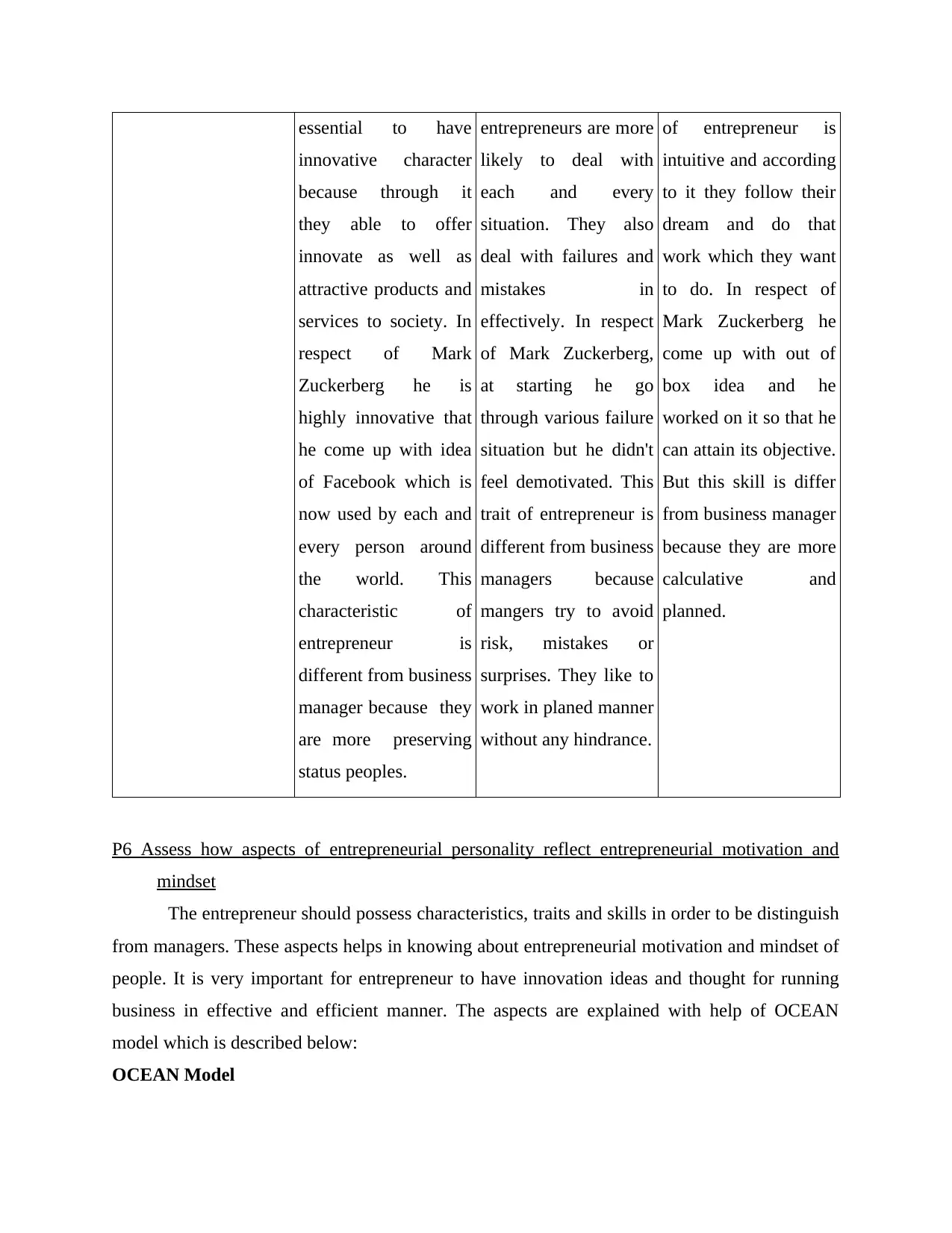
essential to have
innovative character
because through it
they able to offer
innovate as well as
attractive products and
services to society. In
respect of Mark
Zuckerberg he is
highly innovative that
he come up with idea
of Facebook which is
now used by each and
every person around
the world. This
characteristic of
entrepreneur is
different from business
manager because they
are more preserving
status peoples.
entrepreneurs are more
likely to deal with
each and every
situation. They also
deal with failures and
mistakes in
effectively. In respect
of Mark Zuckerberg,
at starting he go
through various failure
situation but he didn't
feel demotivated. This
trait of entrepreneur is
different from business
managers because
mangers try to avoid
risk, mistakes or
surprises. They like to
work in planed manner
without any hindrance.
of entrepreneur is
intuitive and according
to it they follow their
dream and do that
work which they want
to do. In respect of
Mark Zuckerberg he
come up with out of
box idea and he
worked on it so that he
can attain its objective.
But this skill is differ
from business manager
because they are more
calculative and
planned.
P6 Assess how aspects of entrepreneurial personality reflect entrepreneurial motivation and
mindset
The entrepreneur should possess characteristics, traits and skills in order to be distinguish
from managers. These aspects helps in knowing about entrepreneurial motivation and mindset of
people. It is very important for entrepreneur to have innovation ideas and thought for running
business in effective and efficient manner. The aspects are explained with help of OCEAN
model which is described below:
OCEAN Model
innovative character
because through it
they able to offer
innovate as well as
attractive products and
services to society. In
respect of Mark
Zuckerberg he is
highly innovative that
he come up with idea
of Facebook which is
now used by each and
every person around
the world. This
characteristic of
entrepreneur is
different from business
manager because they
are more preserving
status peoples.
entrepreneurs are more
likely to deal with
each and every
situation. They also
deal with failures and
mistakes in
effectively. In respect
of Mark Zuckerberg,
at starting he go
through various failure
situation but he didn't
feel demotivated. This
trait of entrepreneur is
different from business
managers because
mangers try to avoid
risk, mistakes or
surprises. They like to
work in planed manner
without any hindrance.
of entrepreneur is
intuitive and according
to it they follow their
dream and do that
work which they want
to do. In respect of
Mark Zuckerberg he
come up with out of
box idea and he
worked on it so that he
can attain its objective.
But this skill is differ
from business manager
because they are more
calculative and
planned.
P6 Assess how aspects of entrepreneurial personality reflect entrepreneurial motivation and
mindset
The entrepreneur should possess characteristics, traits and skills in order to be distinguish
from managers. These aspects helps in knowing about entrepreneurial motivation and mindset of
people. It is very important for entrepreneur to have innovation ideas and thought for running
business in effective and efficient manner. The aspects are explained with help of OCEAN
model which is described below:
OCEAN Model
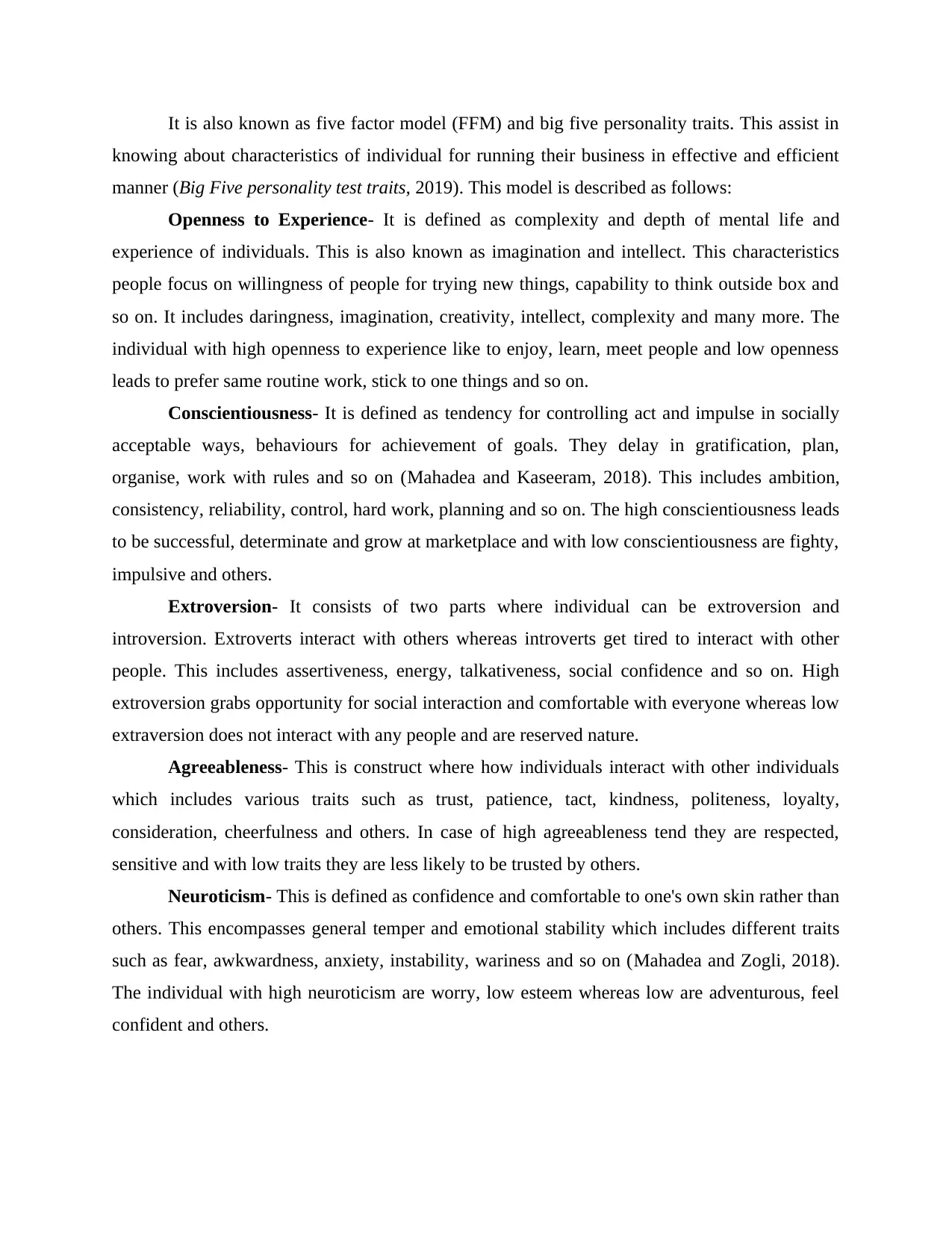
It is also known as five factor model (FFM) and big five personality traits. This assist in
knowing about characteristics of individual for running their business in effective and efficient
manner (Big Five personality test traits, 2019). This model is described as follows:
Openness to Experience- It is defined as complexity and depth of mental life and
experience of individuals. This is also known as imagination and intellect. This characteristics
people focus on willingness of people for trying new things, capability to think outside box and
so on. It includes daringness, imagination, creativity, intellect, complexity and many more. The
individual with high openness to experience like to enjoy, learn, meet people and low openness
leads to prefer same routine work, stick to one things and so on.
Conscientiousness- It is defined as tendency for controlling act and impulse in socially
acceptable ways, behaviours for achievement of goals. They delay in gratification, plan,
organise, work with rules and so on (Mahadea and Kaseeram, 2018). This includes ambition,
consistency, reliability, control, hard work, planning and so on. The high conscientiousness leads
to be successful, determinate and grow at marketplace and with low conscientiousness are fighty,
impulsive and others.
Extroversion- It consists of two parts where individual can be extroversion and
introversion. Extroverts interact with others whereas introverts get tired to interact with other
people. This includes assertiveness, energy, talkativeness, social confidence and so on. High
extroversion grabs opportunity for social interaction and comfortable with everyone whereas low
extraversion does not interact with any people and are reserved nature.
Agreeableness- This is construct where how individuals interact with other individuals
which includes various traits such as trust, patience, tact, kindness, politeness, loyalty,
consideration, cheerfulness and others. In case of high agreeableness tend they are respected,
sensitive and with low traits they are less likely to be trusted by others.
Neuroticism- This is defined as confidence and comfortable to one's own skin rather than
others. This encompasses general temper and emotional stability which includes different traits
such as fear, awkwardness, anxiety, instability, wariness and so on (Mahadea and Zogli, 2018).
The individual with high neuroticism are worry, low esteem whereas low are adventurous, feel
confident and others.
knowing about characteristics of individual for running their business in effective and efficient
manner (Big Five personality test traits, 2019). This model is described as follows:
Openness to Experience- It is defined as complexity and depth of mental life and
experience of individuals. This is also known as imagination and intellect. This characteristics
people focus on willingness of people for trying new things, capability to think outside box and
so on. It includes daringness, imagination, creativity, intellect, complexity and many more. The
individual with high openness to experience like to enjoy, learn, meet people and low openness
leads to prefer same routine work, stick to one things and so on.
Conscientiousness- It is defined as tendency for controlling act and impulse in socially
acceptable ways, behaviours for achievement of goals. They delay in gratification, plan,
organise, work with rules and so on (Mahadea and Kaseeram, 2018). This includes ambition,
consistency, reliability, control, hard work, planning and so on. The high conscientiousness leads
to be successful, determinate and grow at marketplace and with low conscientiousness are fighty,
impulsive and others.
Extroversion- It consists of two parts where individual can be extroversion and
introversion. Extroverts interact with others whereas introverts get tired to interact with other
people. This includes assertiveness, energy, talkativeness, social confidence and so on. High
extroversion grabs opportunity for social interaction and comfortable with everyone whereas low
extraversion does not interact with any people and are reserved nature.
Agreeableness- This is construct where how individuals interact with other individuals
which includes various traits such as trust, patience, tact, kindness, politeness, loyalty,
consideration, cheerfulness and others. In case of high agreeableness tend they are respected,
sensitive and with low traits they are less likely to be trusted by others.
Neuroticism- This is defined as confidence and comfortable to one's own skin rather than
others. This encompasses general temper and emotional stability which includes different traits
such as fear, awkwardness, anxiety, instability, wariness and so on (Mahadea and Zogli, 2018).
The individual with high neuroticism are worry, low esteem whereas low are adventurous, feel
confident and others.
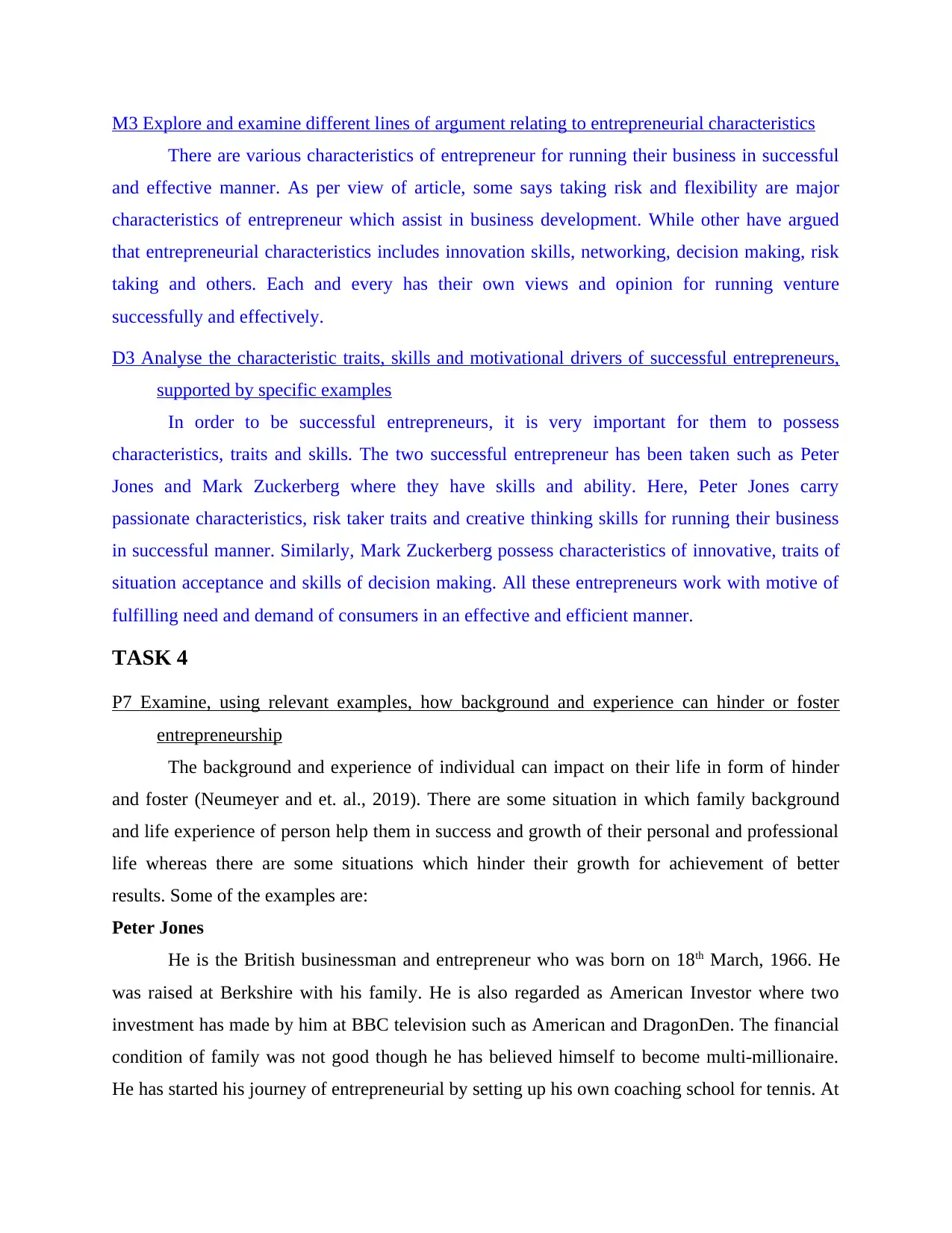
M3 Explore and examine different lines of argument relating to entrepreneurial characteristics
There are various characteristics of entrepreneur for running their business in successful
and effective manner. As per view of article, some says taking risk and flexibility are major
characteristics of entrepreneur which assist in business development. While other have argued
that entrepreneurial characteristics includes innovation skills, networking, decision making, risk
taking and others. Each and every has their own views and opinion for running venture
successfully and effectively.
D3 Analyse the characteristic traits, skills and motivational drivers of successful entrepreneurs,
supported by specific examples
In order to be successful entrepreneurs, it is very important for them to possess
characteristics, traits and skills. The two successful entrepreneur has been taken such as Peter
Jones and Mark Zuckerberg where they have skills and ability. Here, Peter Jones carry
passionate characteristics, risk taker traits and creative thinking skills for running their business
in successful manner. Similarly, Mark Zuckerberg possess characteristics of innovative, traits of
situation acceptance and skills of decision making. All these entrepreneurs work with motive of
fulfilling need and demand of consumers in an effective and efficient manner.
TASK 4
P7 Examine, using relevant examples, how background and experience can hinder or foster
entrepreneurship
The background and experience of individual can impact on their life in form of hinder
and foster (Neumeyer and et. al., 2019). There are some situation in which family background
and life experience of person help them in success and growth of their personal and professional
life whereas there are some situations which hinder their growth for achievement of better
results. Some of the examples are:
Peter Jones
He is the British businessman and entrepreneur who was born on 18th March, 1966. He
was raised at Berkshire with his family. He is also regarded as American Investor where two
investment has made by him at BBC television such as American and DragonDen. The financial
condition of family was not good though he has believed himself to become multi-millionaire.
He has started his journey of entrepreneurial by setting up his own coaching school for tennis. At
There are various characteristics of entrepreneur for running their business in successful
and effective manner. As per view of article, some says taking risk and flexibility are major
characteristics of entrepreneur which assist in business development. While other have argued
that entrepreneurial characteristics includes innovation skills, networking, decision making, risk
taking and others. Each and every has their own views and opinion for running venture
successfully and effectively.
D3 Analyse the characteristic traits, skills and motivational drivers of successful entrepreneurs,
supported by specific examples
In order to be successful entrepreneurs, it is very important for them to possess
characteristics, traits and skills. The two successful entrepreneur has been taken such as Peter
Jones and Mark Zuckerberg where they have skills and ability. Here, Peter Jones carry
passionate characteristics, risk taker traits and creative thinking skills for running their business
in successful manner. Similarly, Mark Zuckerberg possess characteristics of innovative, traits of
situation acceptance and skills of decision making. All these entrepreneurs work with motive of
fulfilling need and demand of consumers in an effective and efficient manner.
TASK 4
P7 Examine, using relevant examples, how background and experience can hinder or foster
entrepreneurship
The background and experience of individual can impact on their life in form of hinder
and foster (Neumeyer and et. al., 2019). There are some situation in which family background
and life experience of person help them in success and growth of their personal and professional
life whereas there are some situations which hinder their growth for achievement of better
results. Some of the examples are:
Peter Jones
He is the British businessman and entrepreneur who was born on 18th March, 1966. He
was raised at Berkshire with his family. He is also regarded as American Investor where two
investment has made by him at BBC television such as American and DragonDen. The financial
condition of family was not good though he has believed himself to become multi-millionaire.
He has started his journey of entrepreneurial by setting up his own coaching school for tennis. At
Secure Best Marks with AI Grader
Need help grading? Try our AI Grader for instant feedback on your assignments.

the age of 20, he initiated computer business that leads him to buy house, BMW and so on. By
his mistake, he has loosed business and faced tough stage. In 1998, he formed his own Phones
International Group under his direction. Currently, he is employing more than 1000 people who
generates more than 250 million pounds. He has out of box thinking skills for work performance.
Mark Zuckerberg
Mark Zuckerberg is an American technological entrepreneur who was born at 14th May
1984. He completed his education from Harvard university and he is generally known as co
founder of Facebook. He belongs from a very well off family that help him in developing bright
and sound future. Along with this, Mark Zuckerberg's background, experiences, culture,
nationality and traits always foster him in developing more effective career. He is introvert
person due to which he didn't have many friends, he spend most of the time with his family and
other activities. He was also very much interested in technology and software, his family well
known about and they they are also supporting him. Along with this, father of Mark Zuckerberg
is a dentist and he always support to his child. This shows that family background as well as life
experience of Mark Zuckerberg always help him in creating sound career and becoming
successful entrepreneur.
M4 Analyse the link between entrepreneurial characteristics and the influence of personal
background and experience to specific successful entrepreneurs
The successful entrepreneurs taken for report is Peter Jones and Marks Zuckerberg. Here,
Peter Jones carry passionate characteristics and belong from poor family background where he
did not get opportunity to go to good school. As he has motive to start own business where he
started business journey at the age of 20 and failed many times and became successful person.
Similarly, Mark Zuckerberg has innovative characteristics and belongs from well off family
background who has supported him a lot. The family background assist him for developing
career and personal growth to become successful entrepreneur. In this way, characteristics,
family background and experience influence to become successful person.
D4 Critically evaluate how background and experience influences entrepreneurs, both positively
and negatively, by comparing and contrasting examples
The background and experience influences entrepreneurs to become successful in both
positive and negative manner. For example, Peter Jones belongs from poor family background
that influence to become him successful entrepreneur whereas he did not get any support from
his mistake, he has loosed business and faced tough stage. In 1998, he formed his own Phones
International Group under his direction. Currently, he is employing more than 1000 people who
generates more than 250 million pounds. He has out of box thinking skills for work performance.
Mark Zuckerberg
Mark Zuckerberg is an American technological entrepreneur who was born at 14th May
1984. He completed his education from Harvard university and he is generally known as co
founder of Facebook. He belongs from a very well off family that help him in developing bright
and sound future. Along with this, Mark Zuckerberg's background, experiences, culture,
nationality and traits always foster him in developing more effective career. He is introvert
person due to which he didn't have many friends, he spend most of the time with his family and
other activities. He was also very much interested in technology and software, his family well
known about and they they are also supporting him. Along with this, father of Mark Zuckerberg
is a dentist and he always support to his child. This shows that family background as well as life
experience of Mark Zuckerberg always help him in creating sound career and becoming
successful entrepreneur.
M4 Analyse the link between entrepreneurial characteristics and the influence of personal
background and experience to specific successful entrepreneurs
The successful entrepreneurs taken for report is Peter Jones and Marks Zuckerberg. Here,
Peter Jones carry passionate characteristics and belong from poor family background where he
did not get opportunity to go to good school. As he has motive to start own business where he
started business journey at the age of 20 and failed many times and became successful person.
Similarly, Mark Zuckerberg has innovative characteristics and belongs from well off family
background who has supported him a lot. The family background assist him for developing
career and personal growth to become successful entrepreneur. In this way, characteristics,
family background and experience influence to become successful person.
D4 Critically evaluate how background and experience influences entrepreneurs, both positively
and negatively, by comparing and contrasting examples
The background and experience influences entrepreneurs to become successful in both
positive and negative manner. For example, Peter Jones belongs from poor family background
that influence to become him successful entrepreneur whereas he did not get any support from
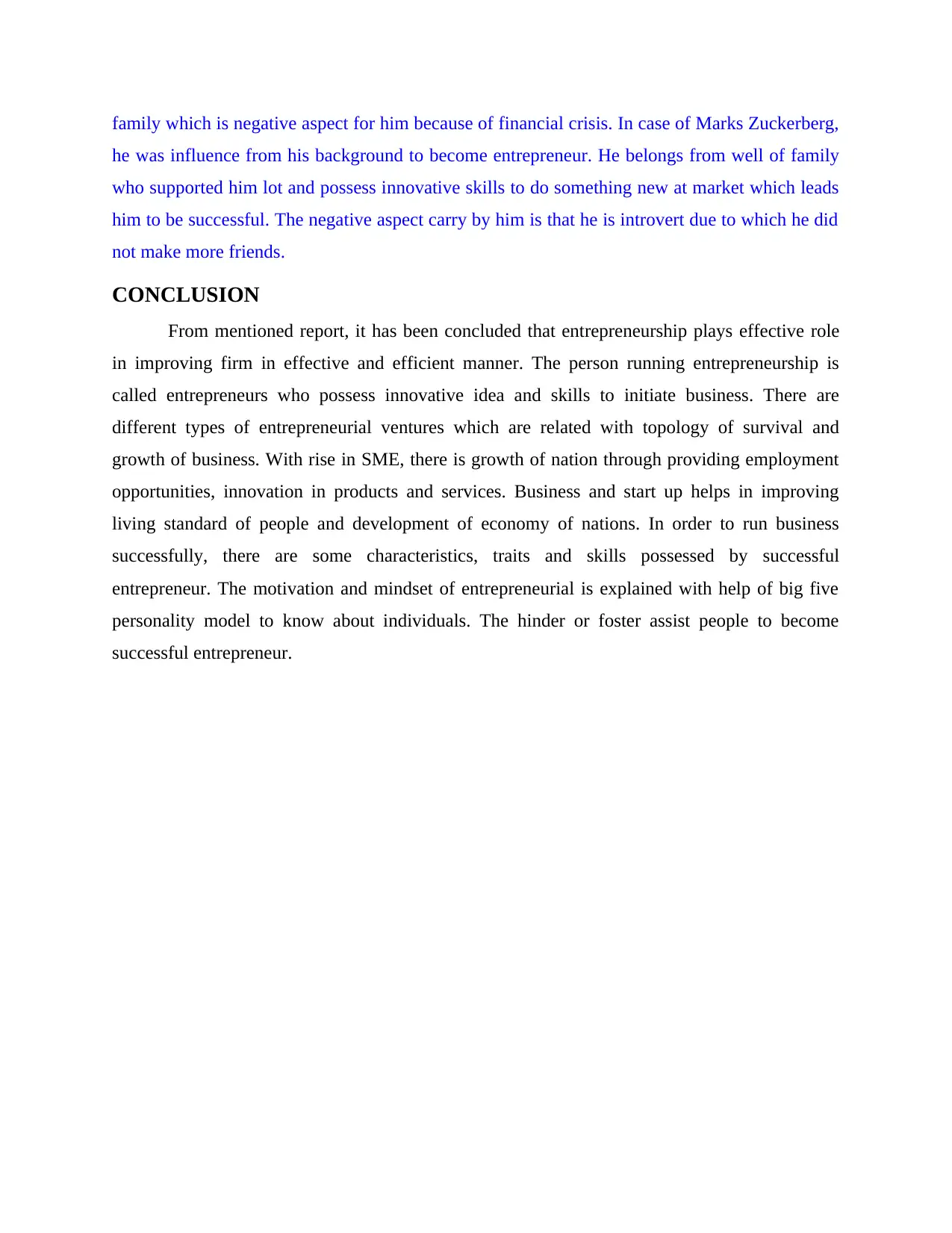
family which is negative aspect for him because of financial crisis. In case of Marks Zuckerberg,
he was influence from his background to become entrepreneur. He belongs from well of family
who supported him lot and possess innovative skills to do something new at market which leads
him to be successful. The negative aspect carry by him is that he is introvert due to which he did
not make more friends.
CONCLUSION
From mentioned report, it has been concluded that entrepreneurship plays effective role
in improving firm in effective and efficient manner. The person running entrepreneurship is
called entrepreneurs who possess innovative idea and skills to initiate business. There are
different types of entrepreneurial ventures which are related with topology of survival and
growth of business. With rise in SME, there is growth of nation through providing employment
opportunities, innovation in products and services. Business and start up helps in improving
living standard of people and development of economy of nations. In order to run business
successfully, there are some characteristics, traits and skills possessed by successful
entrepreneur. The motivation and mindset of entrepreneurial is explained with help of big five
personality model to know about individuals. The hinder or foster assist people to become
successful entrepreneur.
he was influence from his background to become entrepreneur. He belongs from well of family
who supported him lot and possess innovative skills to do something new at market which leads
him to be successful. The negative aspect carry by him is that he is introvert due to which he did
not make more friends.
CONCLUSION
From mentioned report, it has been concluded that entrepreneurship plays effective role
in improving firm in effective and efficient manner. The person running entrepreneurship is
called entrepreneurs who possess innovative idea and skills to initiate business. There are
different types of entrepreneurial ventures which are related with topology of survival and
growth of business. With rise in SME, there is growth of nation through providing employment
opportunities, innovation in products and services. Business and start up helps in improving
living standard of people and development of economy of nations. In order to run business
successfully, there are some characteristics, traits and skills possessed by successful
entrepreneur. The motivation and mindset of entrepreneurial is explained with help of big five
personality model to know about individuals. The hinder or foster assist people to become
successful entrepreneur.
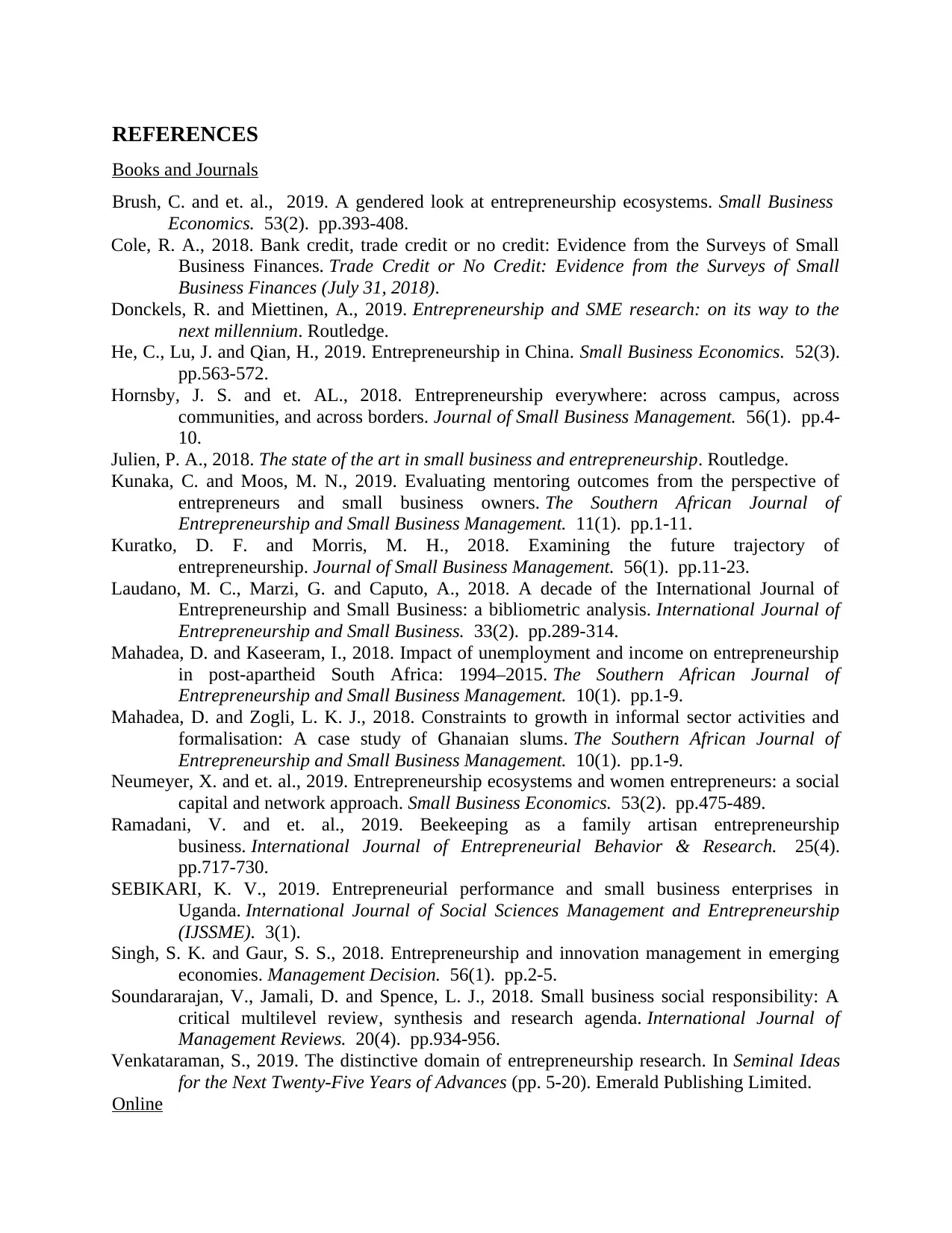
REFERENCES
Books and Journals
Brush, C. and et. al., 2019. A gendered look at entrepreneurship ecosystems. Small Business
Economics. 53(2). pp.393-408.
Cole, R. A., 2018. Bank credit, trade credit or no credit: Evidence from the Surveys of Small
Business Finances. Trade Credit or No Credit: Evidence from the Surveys of Small
Business Finances (July 31, 2018).
Donckels, R. and Miettinen, A., 2019. Entrepreneurship and SME research: on its way to the
next millennium. Routledge.
He, C., Lu, J. and Qian, H., 2019. Entrepreneurship in China. Small Business Economics. 52(3).
pp.563-572.
Hornsby, J. S. and et. AL., 2018. Entrepreneurship everywhere: across campus, across
communities, and across borders. Journal of Small Business Management. 56(1). pp.4-
10.
Julien, P. A., 2018. The state of the art in small business and entrepreneurship. Routledge.
Kunaka, C. and Moos, M. N., 2019. Evaluating mentoring outcomes from the perspective of
entrepreneurs and small business owners. The Southern African Journal of
Entrepreneurship and Small Business Management. 11(1). pp.1-11.
Kuratko, D. F. and Morris, M. H., 2018. Examining the future trajectory of
entrepreneurship. Journal of Small Business Management. 56(1). pp.11-23.
Laudano, M. C., Marzi, G. and Caputo, A., 2018. A decade of the International Journal of
Entrepreneurship and Small Business: a bibliometric analysis. International Journal of
Entrepreneurship and Small Business. 33(2). pp.289-314.
Mahadea, D. and Kaseeram, I., 2018. Impact of unemployment and income on entrepreneurship
in post-apartheid South Africa: 1994–2015. The Southern African Journal of
Entrepreneurship and Small Business Management. 10(1). pp.1-9.
Mahadea, D. and Zogli, L. K. J., 2018. Constraints to growth in informal sector activities and
formalisation: A case study of Ghanaian slums. The Southern African Journal of
Entrepreneurship and Small Business Management. 10(1). pp.1-9.
Neumeyer, X. and et. al., 2019. Entrepreneurship ecosystems and women entrepreneurs: a social
capital and network approach. Small Business Economics. 53(2). pp.475-489.
Ramadani, V. and et. al., 2019. Beekeeping as a family artisan entrepreneurship
business. International Journal of Entrepreneurial Behavior & Research. 25(4).
pp.717-730.
SEBIKARI, K. V., 2019. Entrepreneurial performance and small business enterprises in
Uganda. International Journal of Social Sciences Management and Entrepreneurship
(IJSSME). 3(1).
Singh, S. K. and Gaur, S. S., 2018. Entrepreneurship and innovation management in emerging
economies. Management Decision. 56(1). pp.2-5.
Soundararajan, V., Jamali, D. and Spence, L. J., 2018. Small business social responsibility: A
critical multilevel review, synthesis and research agenda. International Journal of
Management Reviews. 20(4). pp.934-956.
Venkataraman, S., 2019. The distinctive domain of entrepreneurship research. In Seminal Ideas
for the Next Twenty-Five Years of Advances (pp. 5-20). Emerald Publishing Limited.
Online
Books and Journals
Brush, C. and et. al., 2019. A gendered look at entrepreneurship ecosystems. Small Business
Economics. 53(2). pp.393-408.
Cole, R. A., 2018. Bank credit, trade credit or no credit: Evidence from the Surveys of Small
Business Finances. Trade Credit or No Credit: Evidence from the Surveys of Small
Business Finances (July 31, 2018).
Donckels, R. and Miettinen, A., 2019. Entrepreneurship and SME research: on its way to the
next millennium. Routledge.
He, C., Lu, J. and Qian, H., 2019. Entrepreneurship in China. Small Business Economics. 52(3).
pp.563-572.
Hornsby, J. S. and et. AL., 2018. Entrepreneurship everywhere: across campus, across
communities, and across borders. Journal of Small Business Management. 56(1). pp.4-
10.
Julien, P. A., 2018. The state of the art in small business and entrepreneurship. Routledge.
Kunaka, C. and Moos, M. N., 2019. Evaluating mentoring outcomes from the perspective of
entrepreneurs and small business owners. The Southern African Journal of
Entrepreneurship and Small Business Management. 11(1). pp.1-11.
Kuratko, D. F. and Morris, M. H., 2018. Examining the future trajectory of
entrepreneurship. Journal of Small Business Management. 56(1). pp.11-23.
Laudano, M. C., Marzi, G. and Caputo, A., 2018. A decade of the International Journal of
Entrepreneurship and Small Business: a bibliometric analysis. International Journal of
Entrepreneurship and Small Business. 33(2). pp.289-314.
Mahadea, D. and Kaseeram, I., 2018. Impact of unemployment and income on entrepreneurship
in post-apartheid South Africa: 1994–2015. The Southern African Journal of
Entrepreneurship and Small Business Management. 10(1). pp.1-9.
Mahadea, D. and Zogli, L. K. J., 2018. Constraints to growth in informal sector activities and
formalisation: A case study of Ghanaian slums. The Southern African Journal of
Entrepreneurship and Small Business Management. 10(1). pp.1-9.
Neumeyer, X. and et. al., 2019. Entrepreneurship ecosystems and women entrepreneurs: a social
capital and network approach. Small Business Economics. 53(2). pp.475-489.
Ramadani, V. and et. al., 2019. Beekeeping as a family artisan entrepreneurship
business. International Journal of Entrepreneurial Behavior & Research. 25(4).
pp.717-730.
SEBIKARI, K. V., 2019. Entrepreneurial performance and small business enterprises in
Uganda. International Journal of Social Sciences Management and Entrepreneurship
(IJSSME). 3(1).
Singh, S. K. and Gaur, S. S., 2018. Entrepreneurship and innovation management in emerging
economies. Management Decision. 56(1). pp.2-5.
Soundararajan, V., Jamali, D. and Spence, L. J., 2018. Small business social responsibility: A
critical multilevel review, synthesis and research agenda. International Journal of
Management Reviews. 20(4). pp.934-956.
Venkataraman, S., 2019. The distinctive domain of entrepreneurship research. In Seminal Ideas
for the Next Twenty-Five Years of Advances (pp. 5-20). Emerald Publishing Limited.
Online
Paraphrase This Document
Need a fresh take? Get an instant paraphrase of this document with our AI Paraphraser
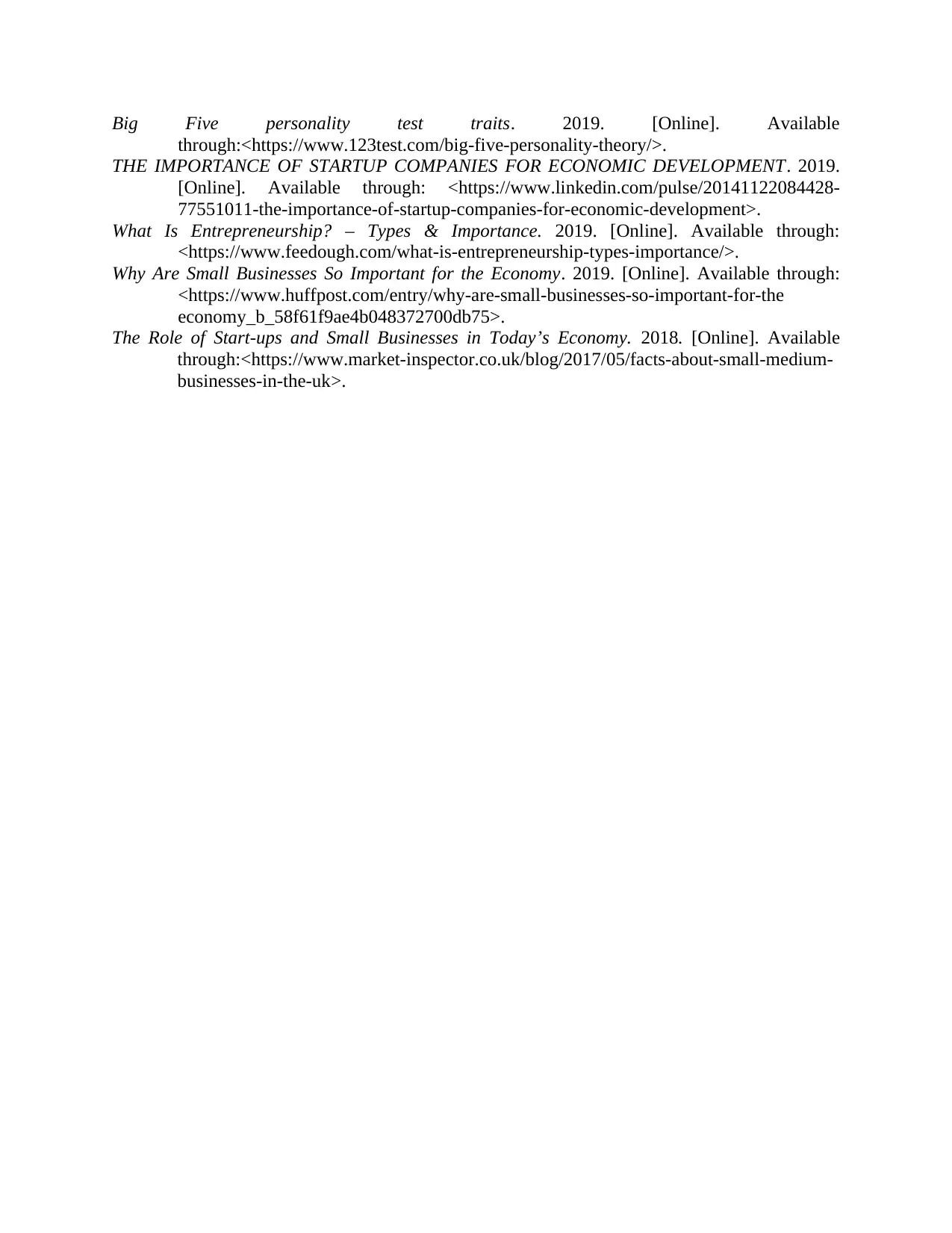
Big Five personality test traits. 2019. [Online]. Available
through:<https://www.123test.com/big-five-personality-theory/>.
THE IMPORTANCE OF STARTUP COMPANIES FOR ECONOMIC DEVELOPMENT. 2019.
[Online]. Available through: <https://www.linkedin.com/pulse/20141122084428-
77551011-the-importance-of-startup-companies-for-economic-development>.
What Is Entrepreneurship? – Types & Importance. 2019. [Online]. Available through:
<https://www.feedough.com/what-is-entrepreneurship-types-importance/>.
Why Are Small Businesses So Important for the Economy. 2019. [Online]. Available through:
<https://www.huffpost.com/entry/why-are-small-businesses-so-important-for-the
economy_b_58f61f9ae4b048372700db75>.
The Role of Start-ups and Small Businesses in Today’s Economy. 2018. [Online]. Available
through:<https://www.market-inspector.co.uk/blog/2017/05/facts-about-small-medium-
businesses-in-the-uk>.
through:<https://www.123test.com/big-five-personality-theory/>.
THE IMPORTANCE OF STARTUP COMPANIES FOR ECONOMIC DEVELOPMENT. 2019.
[Online]. Available through: <https://www.linkedin.com/pulse/20141122084428-
77551011-the-importance-of-startup-companies-for-economic-development>.
What Is Entrepreneurship? – Types & Importance. 2019. [Online]. Available through:
<https://www.feedough.com/what-is-entrepreneurship-types-importance/>.
Why Are Small Businesses So Important for the Economy. 2019. [Online]. Available through:
<https://www.huffpost.com/entry/why-are-small-businesses-so-important-for-the
economy_b_58f61f9ae4b048372700db75>.
The Role of Start-ups and Small Businesses in Today’s Economy. 2018. [Online]. Available
through:<https://www.market-inspector.co.uk/blog/2017/05/facts-about-small-medium-
businesses-in-the-uk>.
1 out of 20
Related Documents
Your All-in-One AI-Powered Toolkit for Academic Success.
+13062052269
info@desklib.com
Available 24*7 on WhatsApp / Email
![[object Object]](/_next/static/media/star-bottom.7253800d.svg)
Unlock your academic potential
© 2024 | Zucol Services PVT LTD | All rights reserved.




